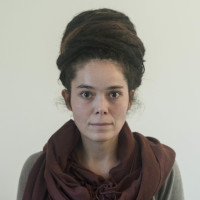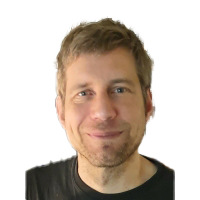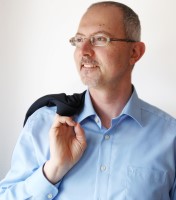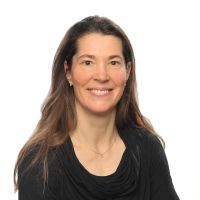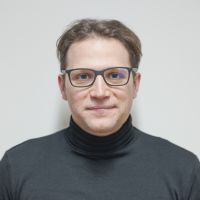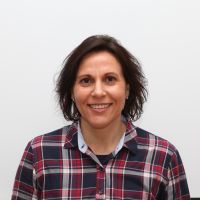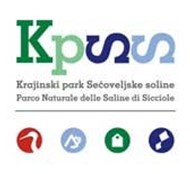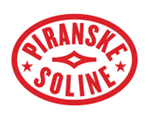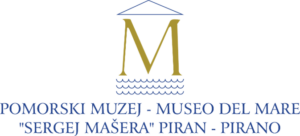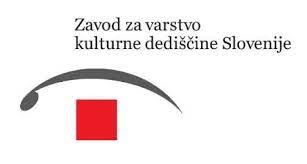ARIS code: J6-50196
Project duration: 1. 10. 2023 – 30. 9. 2026
Participating institute at ZRS Koper: Institute for Philosophical and Religious Studies
Salt-working, environmental wisdom, experiential knowledge, ecoethnography, heritagisation, cohabitation, environmental humanities, ecophenomenology, ecosophy, cultural and natural heritage, saltworks, elemental experience, biosocial becomings, salt, crystallisation, embodied elemental thinking
The research project considers the traditional craft of salt-making, as an embodied practical wisdom. Salt-making in southwestern Slovenia is known for its scenic landscape and valorised for its cultural heritage. At the same time, it is rarely recognized for the unique and persisting interlacement between the saltern’s human and non-human actors. The research strives towards an understanding of salt-making as a reflection of the cohabitation of the human and the environment. The environment offers and transmits its wisdom to the human, who, experiencing this wisdom, eventually comes to embody this wisdom. The research project opens up a novel understanding of salt-making in the field of environmental anthropology. It shall reveal innovative transdisciplinary insights from perspectives of philosophy, heritage and cultural tradition, community formation and transformative governance towards sustainability.
The central objective of the research is to provide a transdisciplinary account of the present-day heritage of salt-making perceived as an experiential environmental wisdom, that springs from the unique relationship between the salt-workers and the environment. It is based on the following guidelines:
1. Gaining ethnographic insight into salt-making as experiential collaboration between the salt-workers and the saltern;
2. discovering relations between salt-workers and the saltern emphasising their mutual influence in forming as biosocial becomings;
3. revealing potential ecosophies germinating from these relations, considering them as new fertile ground for
4. reevaluating the salt-making’s heritagisation and the saltern’s meaning for environmental cohabitation.
The original ecoethnographic approach of this research includes: a) thinking beyond the division between nature and human, b) adopting post-anthropocentric thinking, and c) considering the context of relationality of beings as biosocial becomings. It is supported by ecocentral transdisciplinary grounds, allowing for cross-pollination of insights, and opening of a space for potentially emergent ecosophies that are formative for the tradition of salt-making itself. Special attention will be given to the elements – water, air, fire, soil – that are crystallised and concentrated in the grain of salt. Thinking through philosophies of Maurice Merleau-Ponty and Gaston Bachelard we will strive towards a formulation of a new elemental ecophenomenology.
The project is based on the ecoethnographic method and fieldwork, thus facilitating the convergence of fields of knowledge in environmental humanities, such as environmental anthropology, ecophilosophy, geography, cultural heritage or heritagisation, and political ecology. It thus represents a concrete example of how the humanities can develop into its own version of critical posthumanism, which encourages post-anthropocentric thinking and enables the understanding of knowledge as created on the basis of biosocial relationships of humans with non-human elements, such as the environment, its elements, and other inhabitants. An extensive portion of the methods used in this research are part of fieldwork research, mainly participant observation – the researchers being immersed in the daily life and work of salt-workers. The field, the Sečovlje Salina Nature Park, is the central source of data collecting, observation, participation, experience, and sharing ecoethnographic insights. Other important specific methods of the research project are embodied critical thinking, microphenomenology, walking seminars and elemental phenomenology.
The scientific work of the basic research project “Grain of Salt, Crystallising Cohabitation: Salt-making as Experiential Environmental Wisdom” (J6-50196) is financed by the Slovenian Research and Innovation Agency (ARIS).


Project’s Research Group
The research is implemented by an interdisciplinary research team that offers a solid background for formulating an ecocentral transdisciplinary and innovative account on salt-making. The principal investigator, Maja Bjelica (PhD in Anthropology), besides conducting research in environmental humanities, is part of a group of volunteering salt-workers that for the last six seasons engaged in salt-making. Her connection to the saltern in question guarantees access to the field and allows deeper connections with potential research collaborators. Similarly, Primož Pipan (PhD in Geography) is accustomed to salt-making, as he has lead – in the period 1999–2005 – seven international voluntary camps of salt-workers. Three more members of the research group are directly connected with the saltworks and represent invaluable connections with the local community: Barbara Bradaš Premrl (MSc in Educational Management) who provides the technical support and expertise in her editorial work; Daša Ličen (PhD in Anthropology), who is an expert in local history and heritagisation; and Matjaž Kljun (PhD candidate in political ecology), who as a professionally trained conservator, currently employed at the Institute for the Protection of Cultural Heritage of Slovenia, has been researching the saltern’s cultural heritage for more than a decade and provides access and knowledge about crucial referential documents. Kljun works closely with Jerneja Penca (PhD in International Law), who researches environmental and sustainability governance aspects of socio-ecological systems at the global, regional and national levels. She uses her expertise in connecting experiential knowledge with transformative change. The insights into ecosophies are researched mainly by Petri Berndtson (PhD in Philosophy) and Lenart Škof (PhD in Philosophy). Both being respiratory philosophers, they approach the ecosophies area through elemental ecophenomenology. Their insight are complemented with ecosophies emerging from experiential knowledges, revealed through ecocentral field research.
Principal Investigator
Dr. Maja Bjelica, Deputy Head of the Institute for Philosophical and Religious Studies, in the frame of the project centres her research activity in the field of environmental humanities, especially environmental anthropology supported with ethnographic method, and environmental philosophy, woven with relational ecosophies and elemental ecophenomenology. As principal investigator she strives for a transdisciplinary approach to the research topic, i.e. salt-working, and towards cross-pollinating research insights and reflections. She focuses on revealing salt-working as an activity springing from the cohabitation between the human and nature, the individual, the community and the environment, the subject and the life-world, always being porously connected with each other.
Project Research Group
Dr Petri Berndtson, Research Associate of the Institute for Philosophical and Religious Studies, centres his project research activity in the intertwining fields of elemental philosophy (especially Gaston Bachelard’s elemental poetics), respiratory philosophy (Berndtson 2023) and ecophenomenology (especially Maurice Merleau-Ponty’s phenomenology of perception of the elements). In dialogue with these crossing philosophico-methodological perspectives, Berndtson strives to develop a novel elemental and phenomenological approach in which salt-formation as a process of crystallisation could be understood experientially as atmospheric reversibility and cohabitation between elements (air, water, fire and earth) and salt-workers as situated respiratory body-subjects.
Prof Dr Lenart Škof, Head of the Institute for Philosophical and Religious Studies of ZRS Koper, is one of the leading researchers in the field of respiratory and broader elemental philosophy and related environmental humanities. Using the methods of ecophenomenology, philosophy of nature and respiratory philosophy, which he himself develops, he researches new aspects of elemental philosophy of air, water, earth and fire. He also deals with elemental ontology of minerals and crystals, which is based on the philosophical insights of Erst Haeckel. Within the context of ecosophy, he pays special attention to the intertwining of elemental-atmospheric dwelling as a new branch of ecophenomenology, which can be directly linked to studies of saltworking as a philosophical and experiential practice.
Jerneja Penca, Head of the Mediterranean Institute for Environmental Studies of ZRS Koper, uses her expertise in the field of environmental and sustainable management in understanding the functioning and possible future of the Sečovlje saltworks. Within the project, she considers the hindering and challenging roles of legal norms, institutions and paradigms in the construction of saltworks as a space for coexistence and sustainability, drawing on the social sciences and environmental humanities as conveyed by the rest of the research team.
Matjaž Kljun, Assistant at the Mediterranean Institute for Environmental Studies of ZRS Koper, investigates environmental discourses on the case study of the salterns of Piran or Sečovlje (i.e. Piranske soline or Sečoveljske soline). He focuses on the examination of the cultural and structural conditions in which salt-working was formed in the past and the conditions in which it takes place in the present. He critically defines his findings and the processes of environmental and spatial management, with the conceptual foundations of ecological green political thought and transformation, which is based on deliberative democracy.
Barbara Bradaš Premrl, has several years of experience in the field of libraries and librarianship in higher education and scientific research institutions as well as in the coordination of national and international projects. She manages the personal bibliographies of researchers, supports researchers in providing open access to their scientific publications and keeps track of the professional and scientific activities of the parent institution. Within the project, she is involved in the administration and coordination of project activities.
Project Research Group Members of Partner Organisations
Dr Primož Pipan, Research Associate at the Anton Melik Geographical Institute at ZRC SAZU, explores saltworking from a landscape perspective. In particular, he is interested in the possibilities of rethinking the heritage of the Sečovlje saltern in terms of bridging the long-standing gap between cultural and natural heritage. In the project he is involved in the organisation of walking seminars in the Sečovlje saltern. He also focuses on the comparison of the heritagisation of salt-working and saltern between the saltern of Sečovlje and salterns in Italy, Croatia and France.
Dr Daša Ličen, Assistant Researcher at the Institute for Slovenian Ethnography ZRC SAZU, is a historical anthropologist, an expert in the history of the region and processes of heritagisation. Her main research focus within the project is on the heritagisation of the salt-works and the work of saltworkers, especially in light of the persistent, but questionable, division into natural and cultural heritage.
Research Activities
Research Programme
The research program is two-part, consisting of Ecocentral research activities and Cross-pollinating research activities. The former are mostly carried out simultaneously and are mutually complementary, while the latter are carried out during specific periods or research events, e.g. during the salt harvest, and are directly linked to all four pillars of primary research activities.
A) Ecocentral research activities
A1) Ecocentral Research Immersion: Experiencing Salt-making
This fieldwork research activity is its most extensive part, in order to assure the acquisition of experiential knowledge in the craft of salt-making. Throughout the fieldwork specific focus is devoted to the awareness of its embeddedness into the environment.
- Introduction to salt-making: preliminary data gathering and preparation for fieldwork, mapping of the field, discovering the physical and social layout of the saltern, being involved with the saltern’s community;
- Discovering salt-making (1st year): joining experienced salt-workers to gradually learn specific salt-making skills and acquiring knowledge;
- Becoming salt-workers (2nd year): implementing the experiences and autonomously engaging with the process of salt-working;
- Sharing salt-making (3rd year): transmitting the acquired skills and knowledge of salt-working to interested third parties (members of the local community, researchers, etc).
A2) Ecoethnographic Research in relational biosocial becomings
This part of the research focuses on revealing salt-working as a process resulting from the porous relationality among human and non-human actors, namely the salt-workers and the saltern itself. Insight into different research questions will be gathered through various approaches:
- Interviews I–II (unstructured and semi-structured) with salt-workers and other collaborators;
- Ecophenomenological inquiry on relations affected by the non-human actors present in salt-working (the saltern, salt, brine, salt pools, mud banks…);
- embodied critical thinking analysis focusing on the researchers’ established relations with other salt-workers, the saltern and its elements, which will allow for a self-evaluation of obtained experiential knowledge;
- observing of the characteristics of the saltern’s community and the formation of its environmental cohabitation.
A3) A search for ecosophies: an elemental inquiry
An ecophilosophical analysis of gained data and experience, revealing possible ecosophies of salt-workers, the saltern and its elements.
- Interviews III–IV (structured): interviews based on Embodied Critical Thinking and Micro-phenomenology methods combined with eco-phenomenological self-reflection on experience of and embodiment in the environment to access a possible articulation of ecosophies;
- intensive self-analysis of a possibility of establishing a specific ecosophy from the experience of salt-making in the saltern;
- (Re)establishing an elemental ecophenomenology in the saltern: relationality of the saltern, understanding salt as the result of the interplay among the four elements, which through concentration are crystallised through and as salt;
- Investigating similarities between Bachelard’s studies on alchemical notions of salt and Merleau-Ponty’s flesh.
A4) Heritagisation and environmental cohabitation
Through the ecosophies identified, inquiring into how these understandings affect the heritagisation process on one hand, and how they contribute to the formation of environmental cohabitation on the other.
- Questioning the conceptualisation of the saltern’s heritage and to what extent it considers its unique embeddedness in the environment;
- Researching the possibilities for rethinking the saltern’s heritage to bridge the long-lasting divide of cultural and natural heritage;
- Highlighting the experience of the saltern as a form of sustainability in thinking and practice;
- Reflecting on the governance opportunities and obstacles to scaling up the transformative practice.
B) Cross-pollinating research activities
B1) Walking Seminars
Initiated by Nick Shepherd in 2014, the Walking Seminars consist of embodied research of landscapes and they as well employ an ethnography of walking.
B2) Audio-visual documentation
Photographs, video, and sound recordings are additional research data produced during all the research activities and represent a possibility for an additional retrospective ecoethnographic analysis throughout the duration of the project.
B3) Salt-making: Comparative ecoethnography
Participant observation investigations at the salterns abroad: Cervia in Italy, Nin and Ston in Croatia, and Guérande in France. Each will last approximately two weeks, allowing insight into other possible ecosophies of salterns.
B4) Ecollaboration: salt-workers sharing experiential wisdom
Common practice of sharing information, knowledge, and experience of and about salt-making:
- ‘Salty notes’: a public online platform for sharing experiences of the saltworkers;
- ‘Salty experience’: community workshops in experiencing saltworking.
Namen in pomen projekta
Aims and relevance of the project
The aim of the project is to introduce the present-day salt-making to the local community, interested public, and scientists, from a novel perspective of an experiential environmental wisdom. This ecocentral research will be performed with long-term field work. Researchers will take part in the process of salt-making at the Sečovlje Salina Nature Park. They will engage with the community and the environment of the saltern.
The project’s contribution to development of science is manyfold, since it is situated in a transdisciplinary field of research and adopts a variety of methodologies in several research fields of humanities. First, it contributes crucially to the understanding of the heritage of salt-making that is still active in Slovenia and abroad. The ethnographic approach that it adopts produces an essential addition to the knowledge about salt-making of the past. Second, foregrounding research into the relational aspect of biosocial becoming, it offers an alternative to the divide between nature and culture, allowing for understanding it such as a complex ensemble of becoming. This consecutively offers ground to develop a relational attitude towards the environment beyond its instrumentalization. Third, the search of ecosophies is an innovative way of research relating in and with the environment that encourages articulations and conceptions of original theories, expanding them to fields of heritagisation and sustainable environmental transformation. Fourth, the project the application of innovative research methods, such as walking seminars, embodied critical thinking, micro-phenomenology or elemental ecophenomenology, in the fieldwork, which contributes to overcoming the division between theory and practice.
The results will be presented through scientific publications, conference presentations, the organization of scientific meetings and a publication of a collected volume of contributions on salt-making, bringing together researchers from vast backgrounds and encouraging transdisciplinary scientific collaboration.
The project is designed to deliver its outcomes beyond the scientific community, as well. This will offer a possibility to enhance the ethnographic collection of salt-making already established at the Museum of Salt-making. With its collaborative activities (a public exhibition, an establishment of an online sharing platform, and offering interactive activities of salt-making), the project strives to present its findings to the local community, institutions involved in managing the craft itself, local and national authorities responsible for its preservation. This allows not only for spreading the knowledge about salt-making, but also for a popularization of scientific research in environmental humanities.
Implementation
2024
Public Presentations of the Project Content
Velike Karlovice (Czechia), 25 September 2024, and Ljubljana (Slovenia), 26 September 2024.
Project team members Dr Jerneja Penca and Dr Maja Bjelica presented the project content at two international public events, the first in Veliki Karlovice, Czechia, and the second in Ljubljana, Slovenia. Penca participated in an international workshop entitled Nature-Based Governance: Coevolutionary and Transformative Perspectives on the Biodiversity and Climate Crises, where she presented her reflections on the question “How transformative is the nature restoration law?,” including the example of a saltern landscape. Bjelica participated in the event TO)pot: Festival of Radical Soundwalks where she gave a peripatetic lecture “Listening to Silences, Listening to Rhythms,” in which she also introduced a reflection on listening and silences in the framework of the saltern experience.
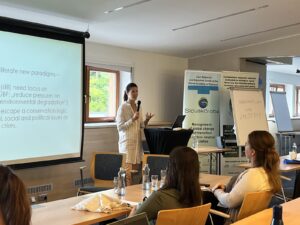
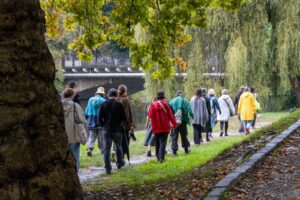
Discovering Salt-Working: Seasonal Fieldwork and Ecocentral Embodied Experience
Sečovlje Salina, Lera, 27 June-5 September 2024
For the first year of the project’s fieldwork grounded on the ecocentral research immersion in the experience of salt-working, we designed an activity of salt-working discovering in which project team members gradually learned specific salt-working skills in collaboration with the local salt workers.
At the end of June, we joined a group of salt workers at the Fond N19 (salt field North no. 19), initially to prepare the salt pools and later to harvest the salt. We found that the salt workers live and work in harmony with other living beings in the saltern and try to respect the environment and ensure minimal interference with their habitat. On the other hand, their working conditions are exceptionally demanding and difficult. Despite the physical demands of the work, the environment in which it is carried out has an idyllic and relaxed atmosphere, facilitated by silence, peace and salty air. Some of us have discovered a kind of routine in the salt-working, whose fundamental characteristics are everydayness and repetitiveness. One of the key findings was that the experience of salt-working has changed our understanding of it. No amount of theoretical knowledge about the process of salt-working or familiarity with its history can replace the experience of salt-working, i.e. physical involvement in the process of working with salt and coexisting with the salina environment. We have become aware of the fact that the tasks of salt-working require an enormous amount of knowledge that is passed on from season to season, from year to year, from generation to generation. Without this kind of experience, it is unimaginable what there is to think about – how many factors influence the salt-working process! From weather conditions to water flow patterns, from the length of the day to the appropriate use of tools – these are factors that influence each other. At the same time, it was possible to see that salt-working represents an alternative to the modern fast-paced and technological way of life, as the work is mainly manual, with natural materials and in the open air. Learning salt-working put us in the position of listeners and we understood that proper salt-working requires a lot of patience and perseverance. We look forward to further experiences.
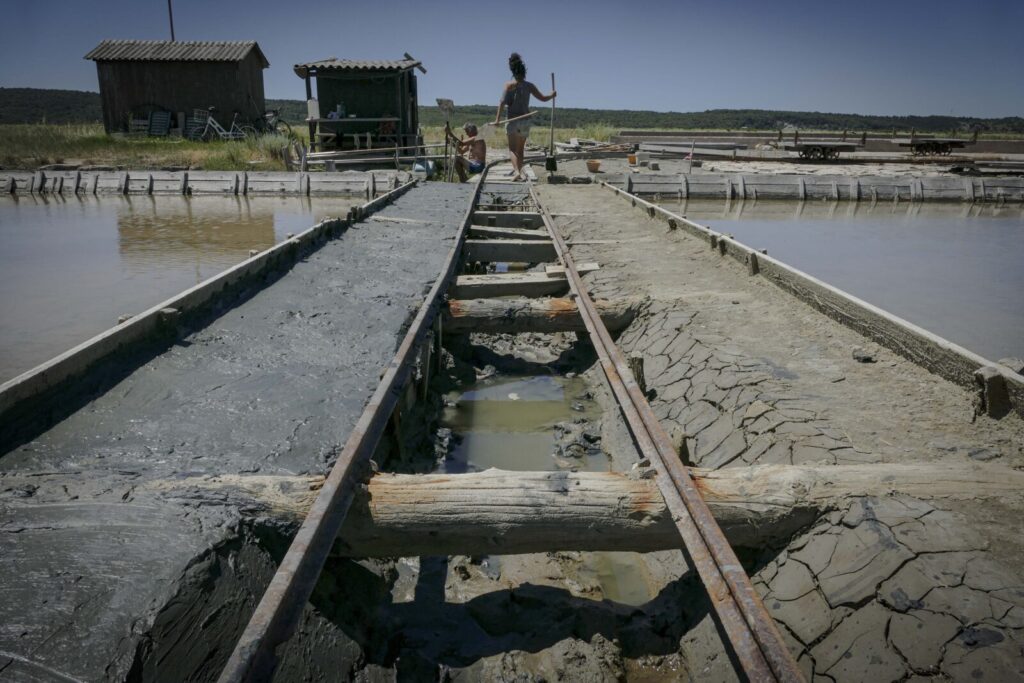
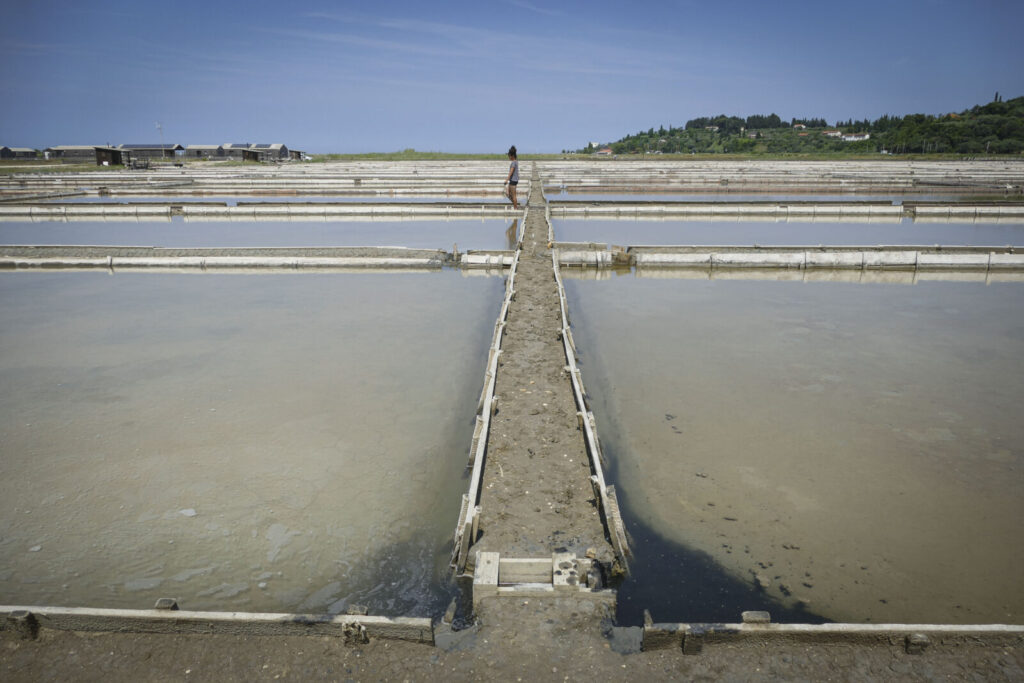
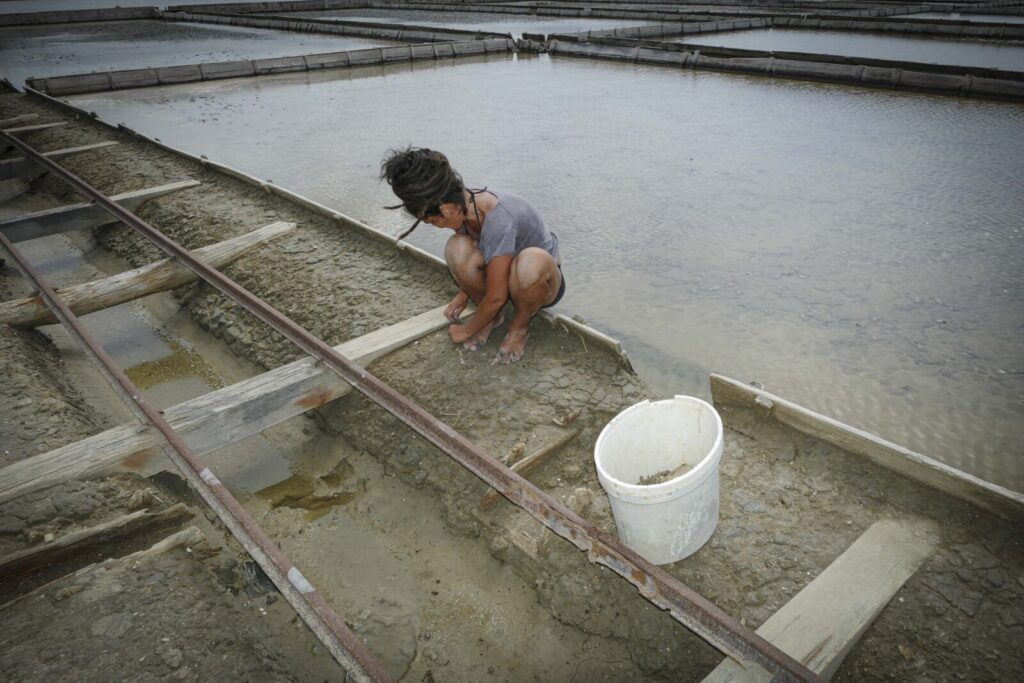
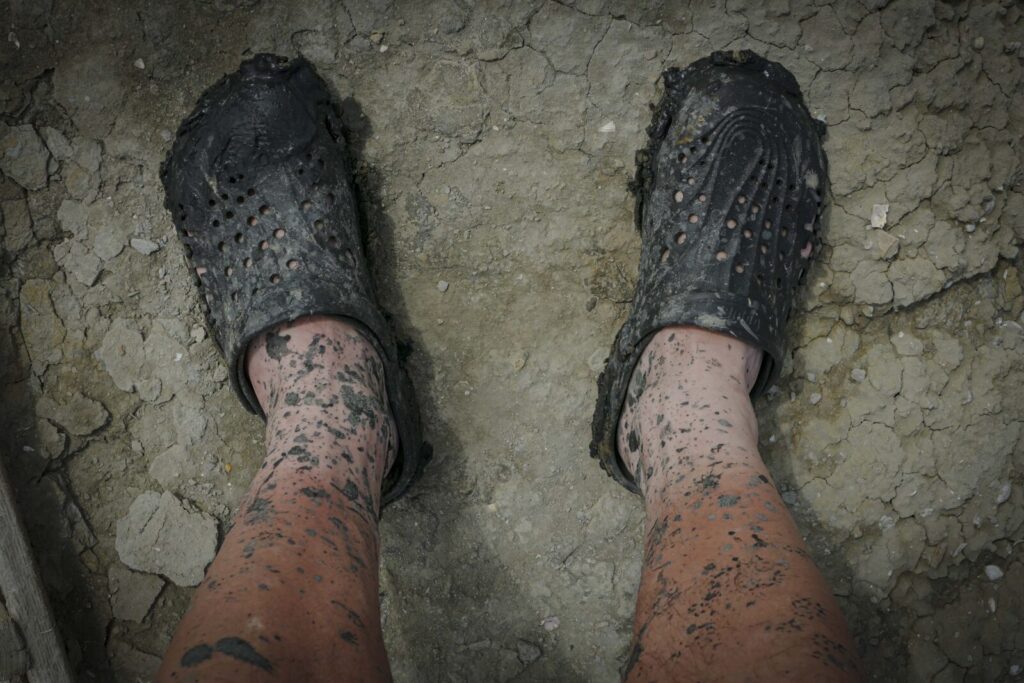
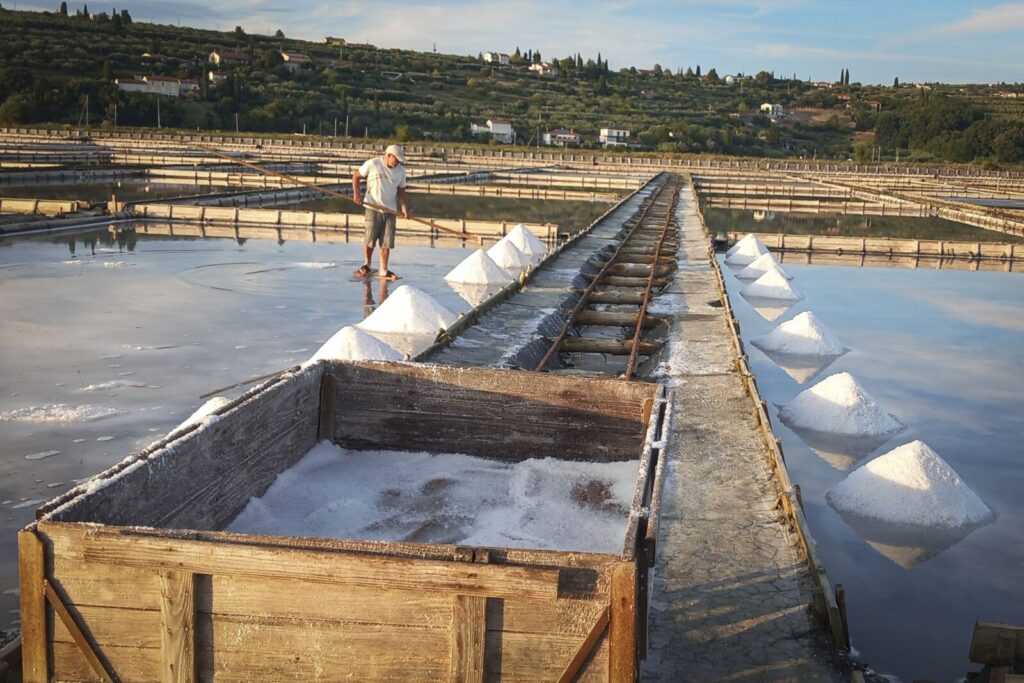
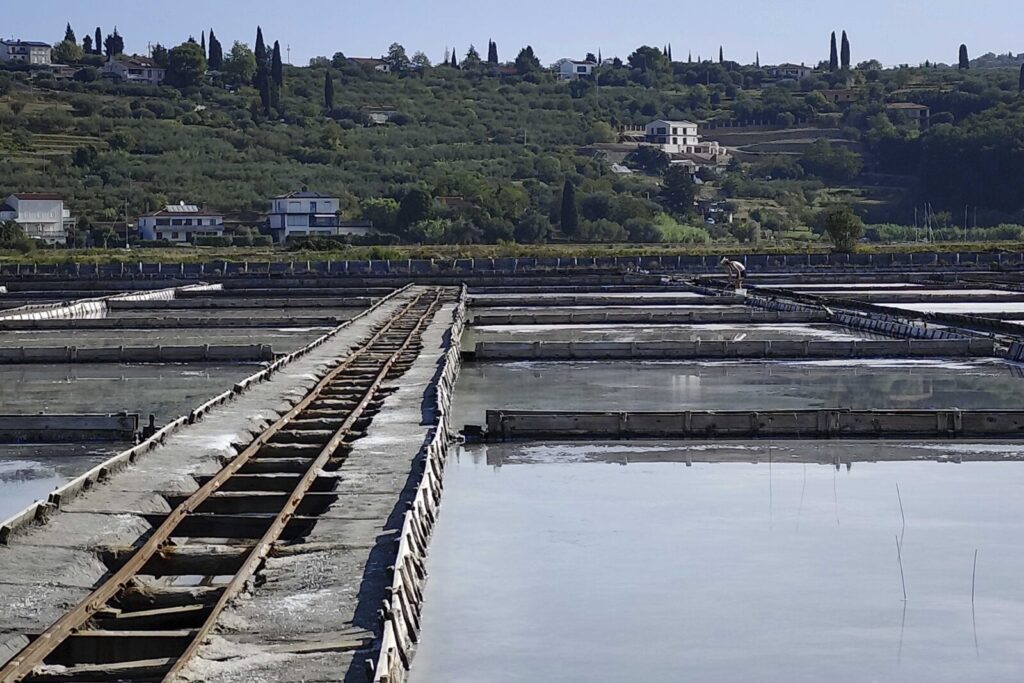
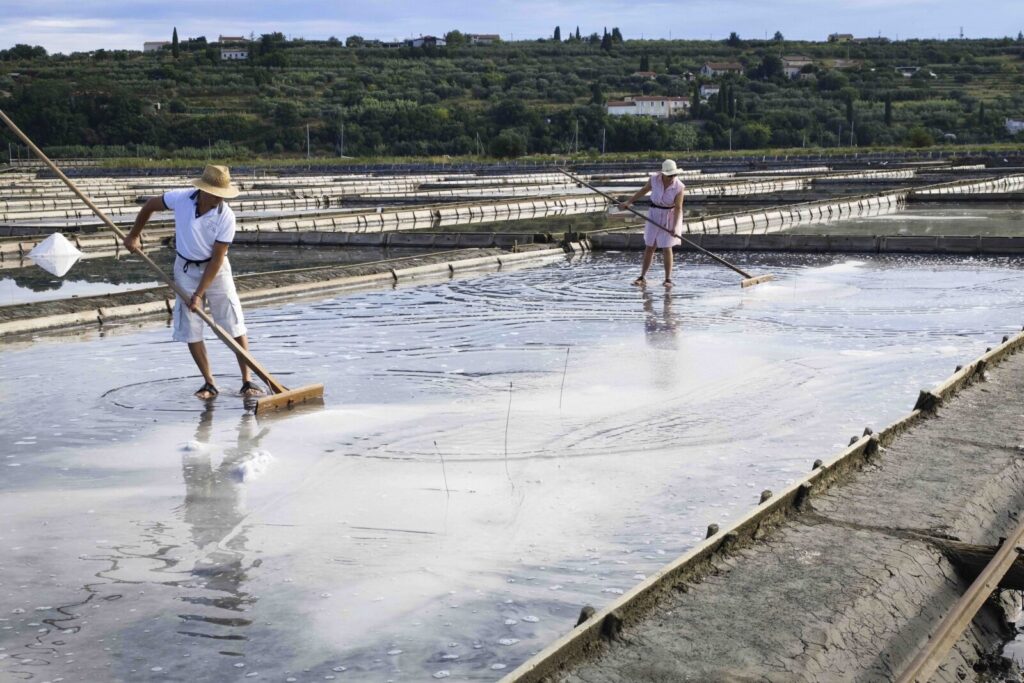
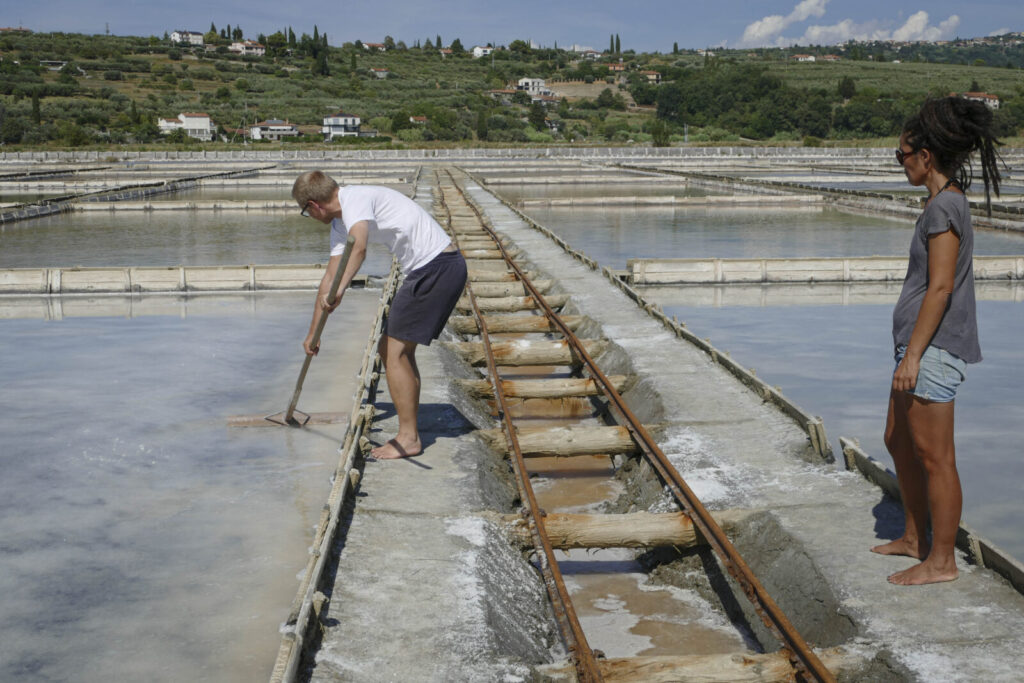
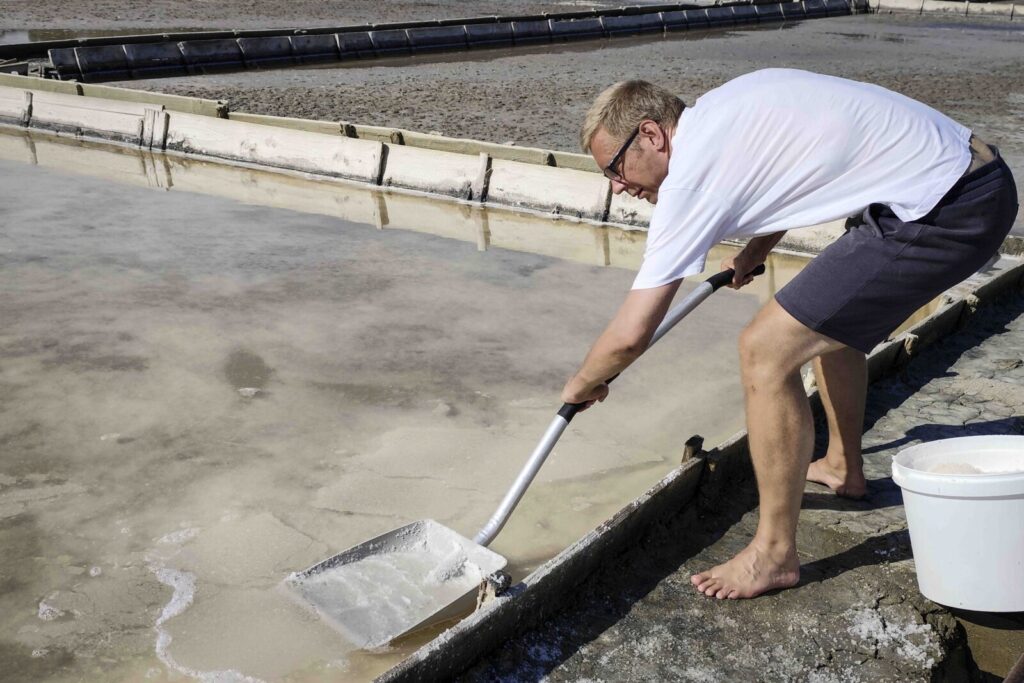
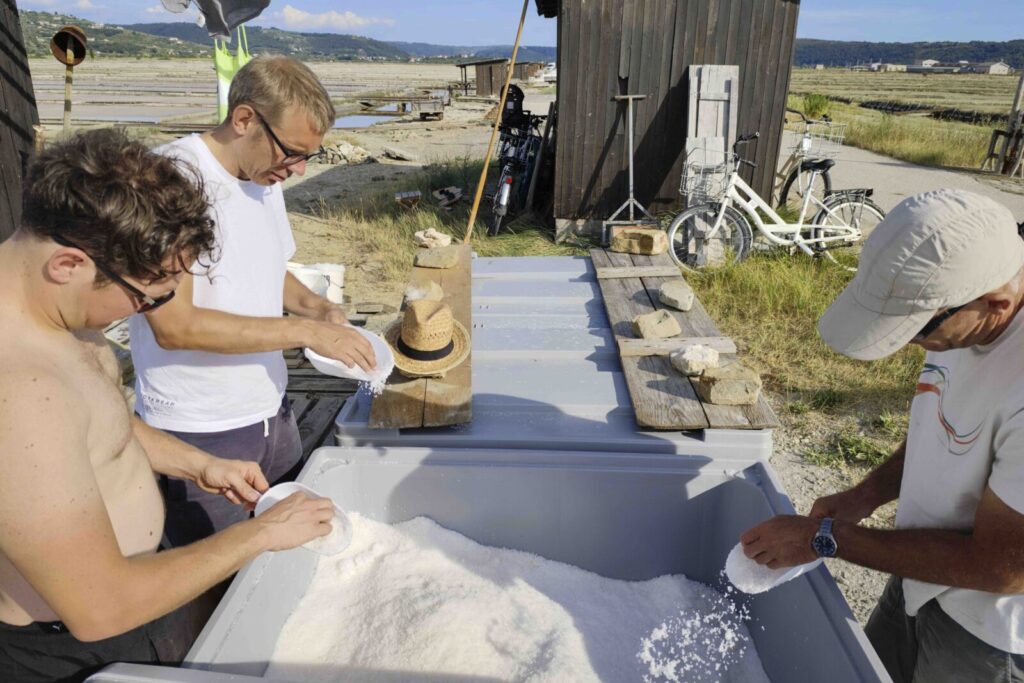
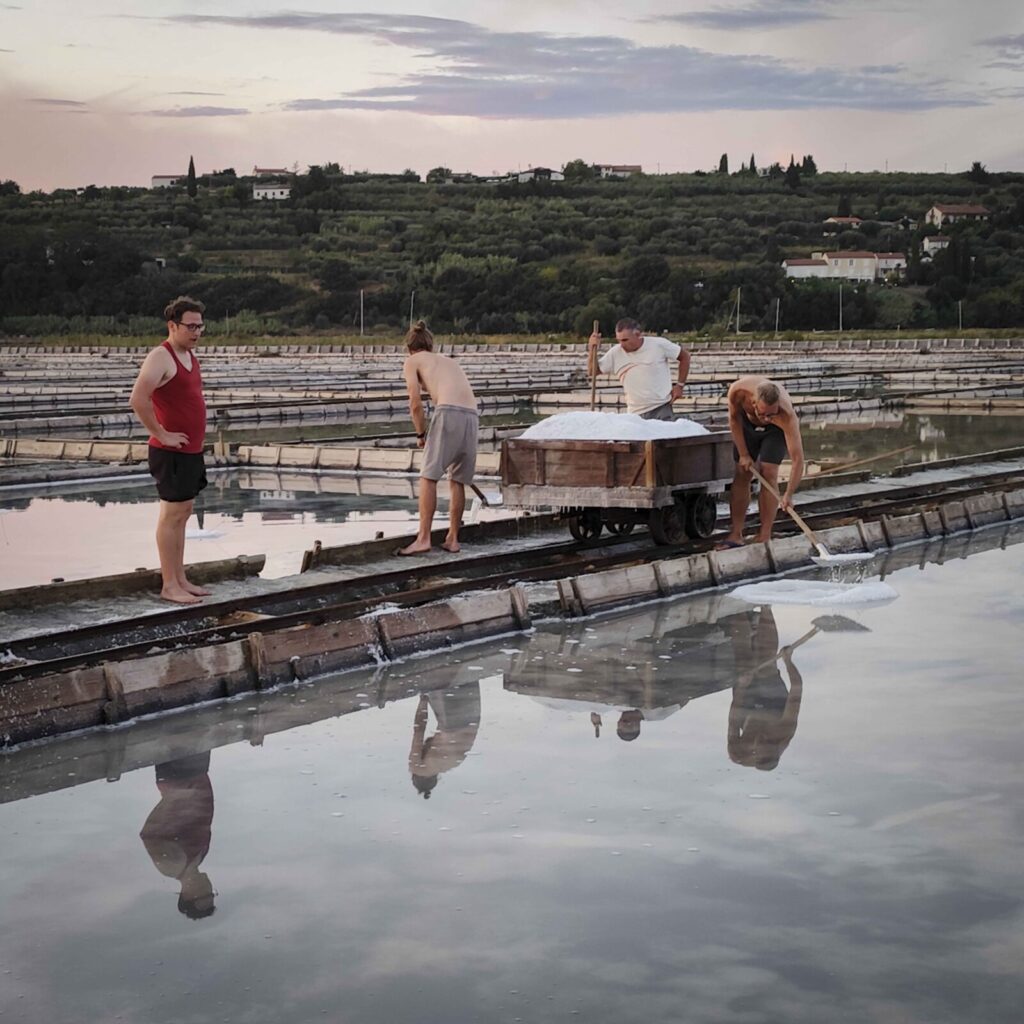
Comparative Study of Salt-Making: Nin, Pag and Ston (Croatia)
Nin, Pag and Ston, 16–19 July 2024
In a collaboration between the research programme “Heritage on the Margins: New Perspectives on Heritage and Identity Within and Beyond the National” (ARIS, P5-0408) and the research project “Grain of Salt, Crystallising Cohabitation: Salt-Making as Experiential Environmental Wisdom” (ARIS, J6-50196), the researcher Primož Pipan – The Research Centre of the Slovenian Academy of Sciences and Arts (ZRC SAZU) – carried out fieldwork in salt works on the Croatian coast from 16 to 19 July 2024. He familiarised himself with the local traditional sea salt extraction processes. In the Nin saltern, he visited the Salt House, the Salt Museum and the Solana Nin shop. On 18 July, he attended the open day of the Nin Saltern. In Pag, he visited the salt museum in the former Pag salt warehouses. In the Pag saltern, he participated in the excursion “morning in the salt fields” and visited the “Butiga soli” salt shop at Solana Pag. In the Ston saltern, he visited the emerging Ston saltern museum and the Ston saltern salt fields.
Pipan notes that in the Croatian salterns, unlike those in Slovenia (Piran), salt crystallisation does not take place on a soil base made of a biosediment called “petola”. In Ston and Nin, salt crystallisation takes place on a stone or concrete floor. In Pag, salt is produced in a modern salt factory. There, the former salt fields are only used for evaporation and to increase the salt content of the brine before the crystallisation phase in the factory. To demonstrate traditional salt production, a former salt field where the salt crystallisation takes place on a biosediment substrate called “petola” has recently been restored.
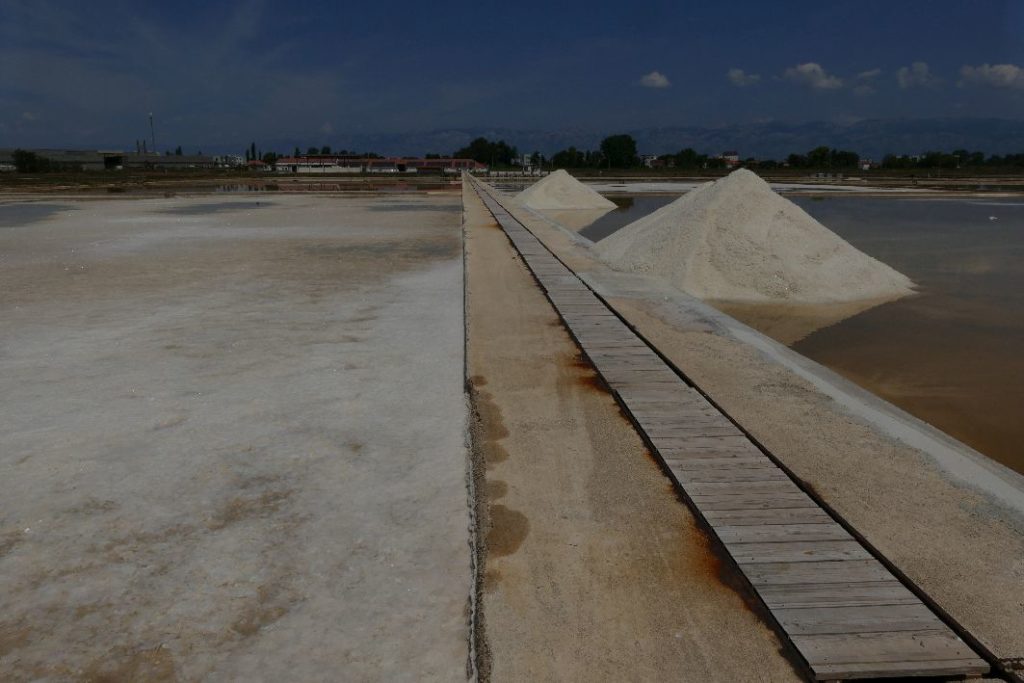
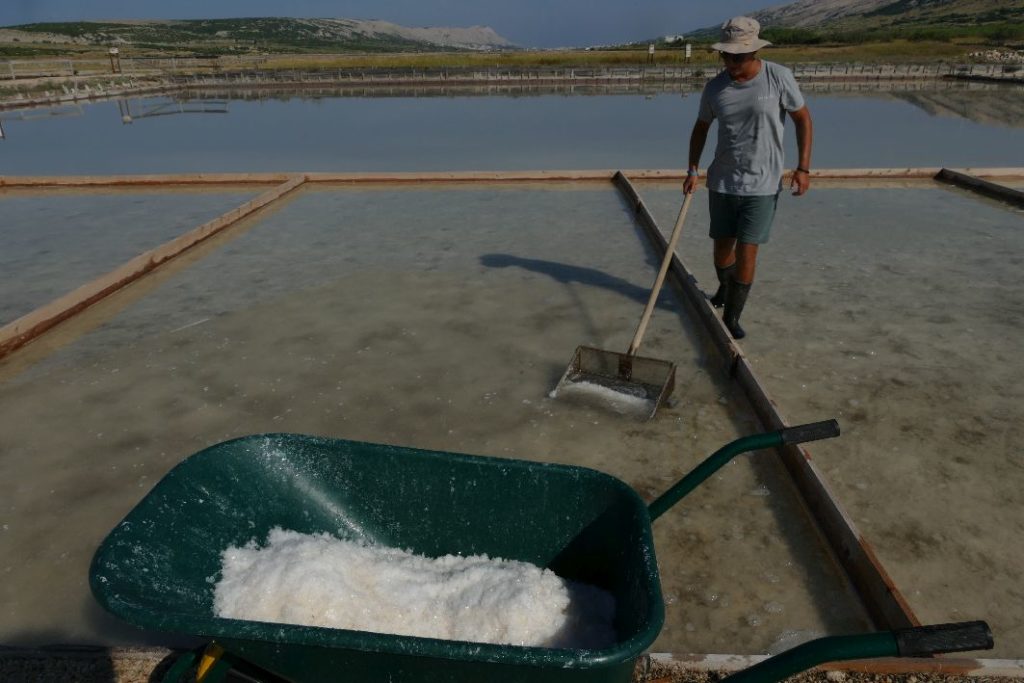
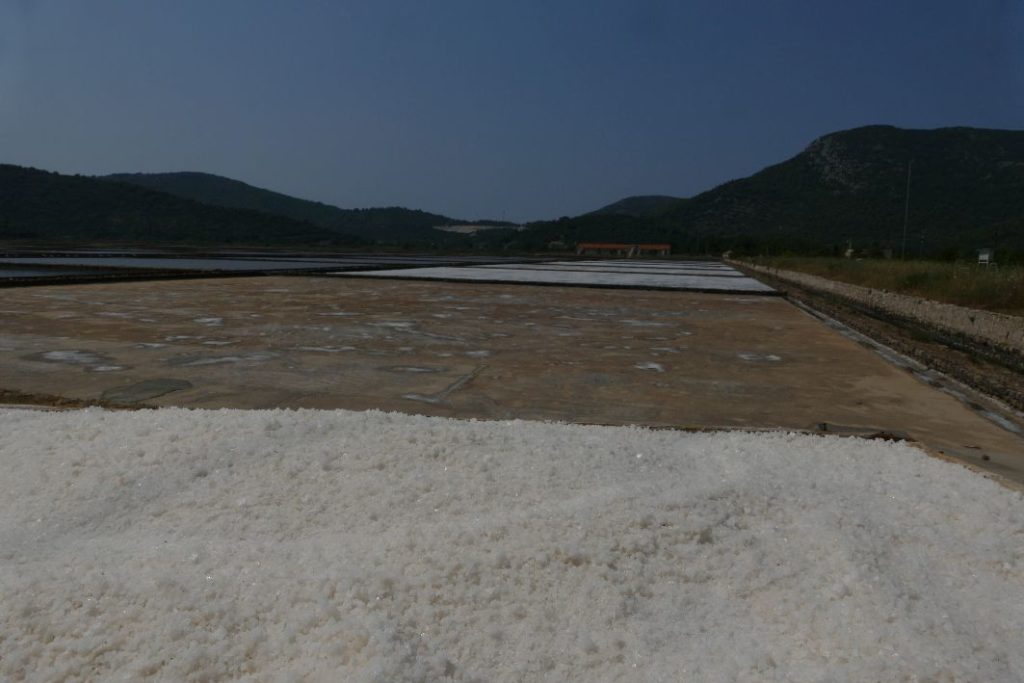
Walking Seminar I – WATER
Sečovlje Salina, 25 and 26 April 2024
Our first project’s walking seminar, based on walking and writing, both of them as a community-based research method, took place in the Sečovlje Salina. The focus of our walking seminar is to justify salt-working as experiential environmental wisdom and to find circumstances, examples and experiences that support or contradict this. Our research is embedded in elemental philosophy, following the idea that in the context of salt-working, the four basic elements – water, air, fire and earth – are communally crystallised together into a new material, a crystal, i.e. salt.
The first of the four walking seminars chose water as its guide. Walking-with-water was the main method of our field research. Water told us about space, about activity, about heritage, about its fellow citizens and co-habitants, and about others we don’t yet know. That is why the guiding research question is water-related: What water does? What does it carry, what does it take? How is it carrying, how does she behave? How does watering occur?
In addition to the four members of the project team, two salt workers took part in the seminar. We also met the curator of the Maritime Museum – Museo del Mare “Sergej Mašera” Piran – Pirano Dr Flavio Bonin, who introduced us to the “Museum of Salt-making” and presented us some of the peculiarities of Piran salt-working in the past. We explored together, through experiencing the space and the activities, by sharing our thoughts, reflections, concerns and considerations, conversations and listening. Each of us took on a specific role in the dissemination of knowledge about salt-working, whether experiential or conceptual. We shared and discussed our experiences with each other and, after the walking seminar, we recorded them in the form of words, sketches, sentences, essays and other forms of expression.
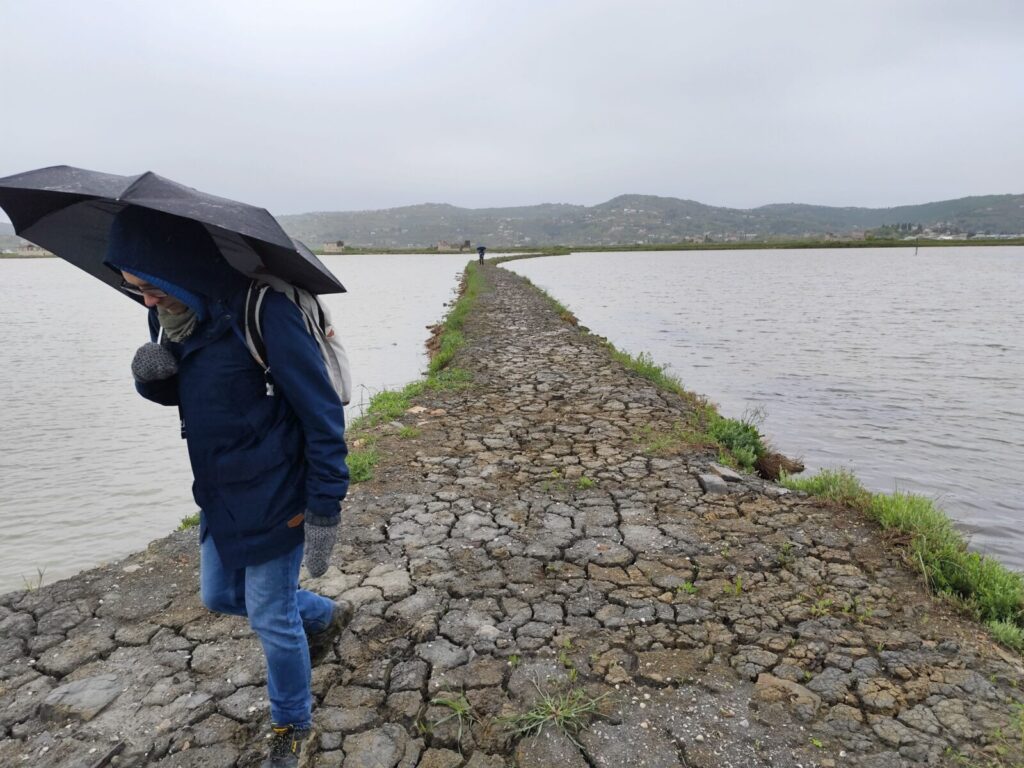
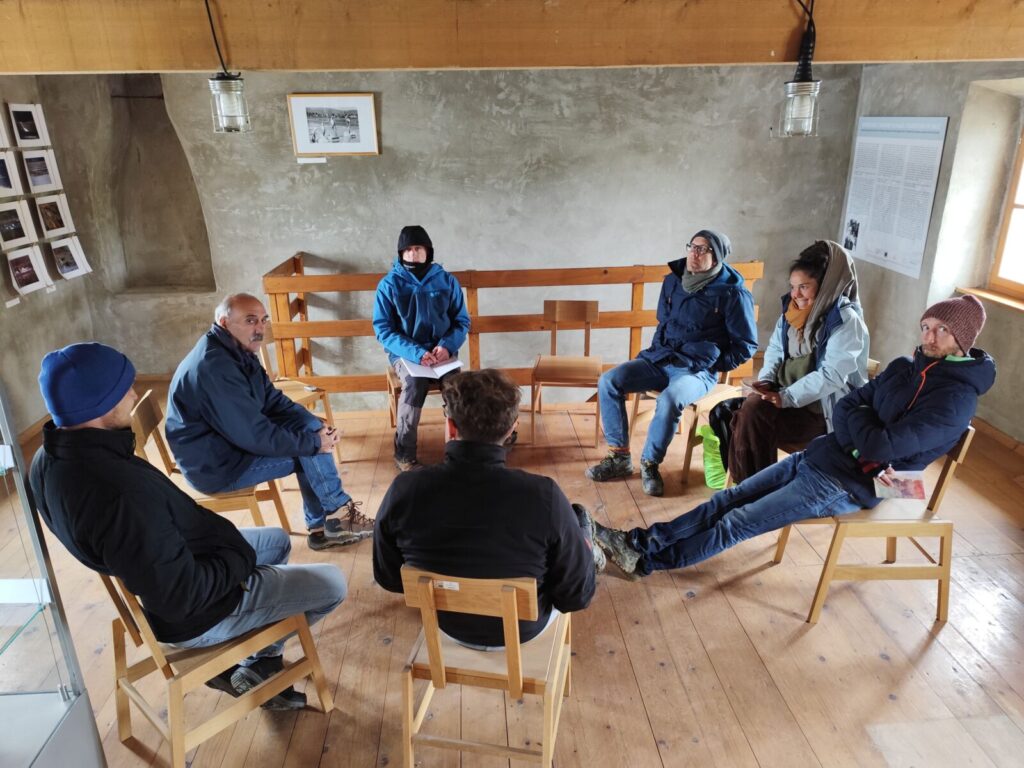
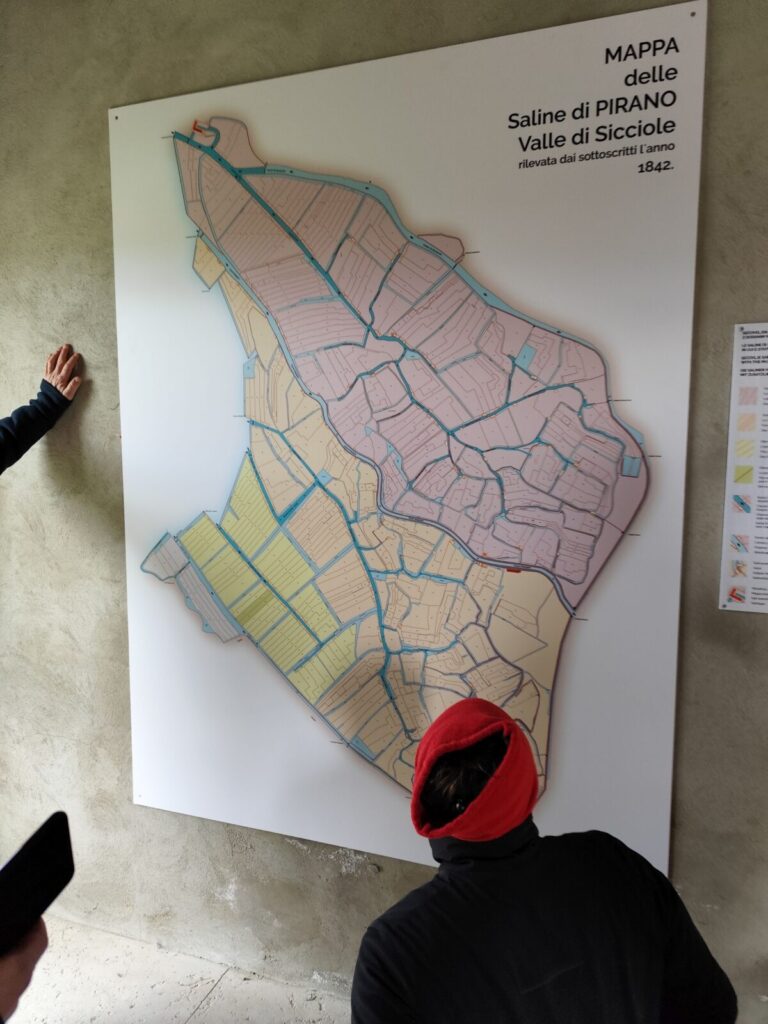
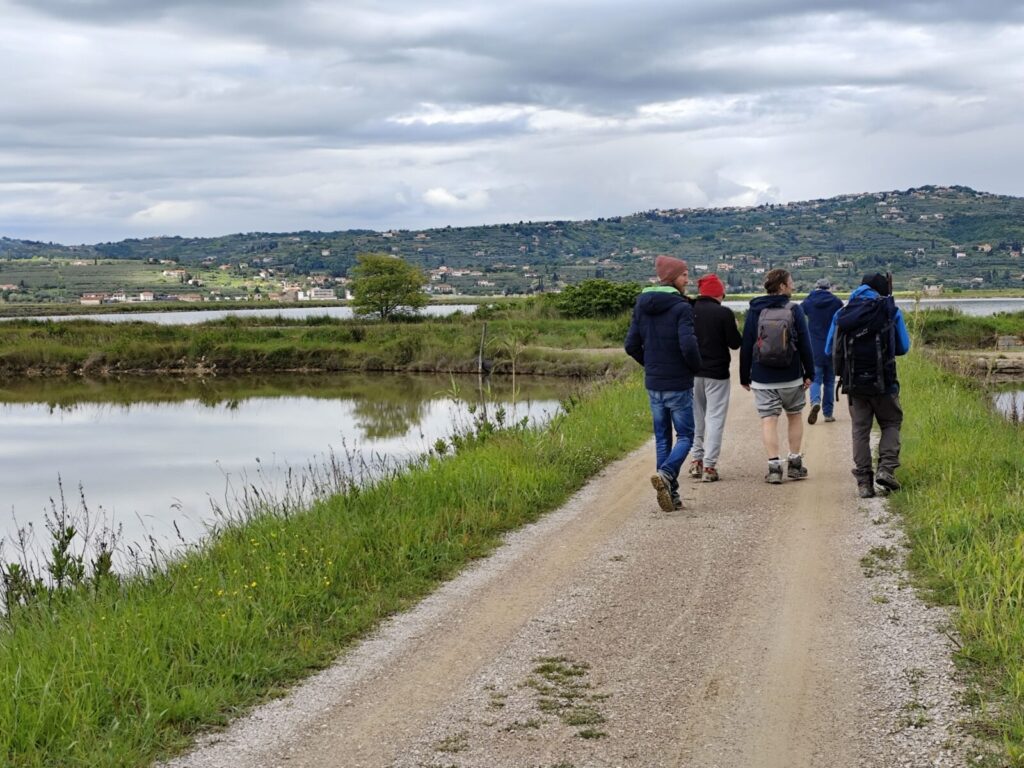
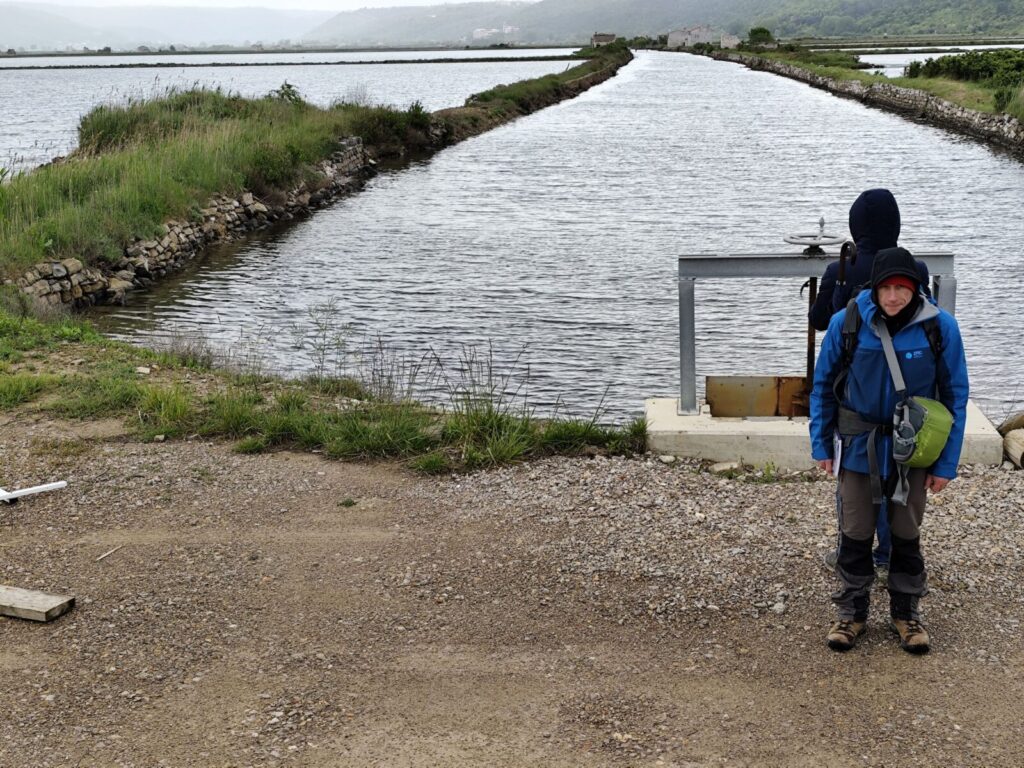
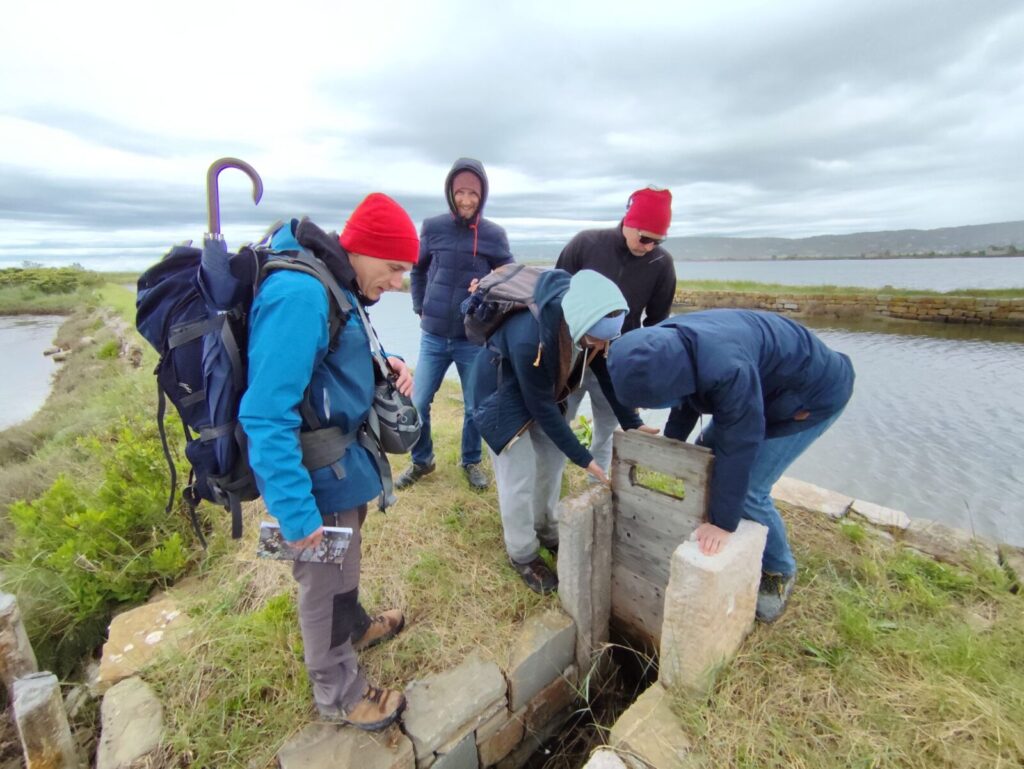
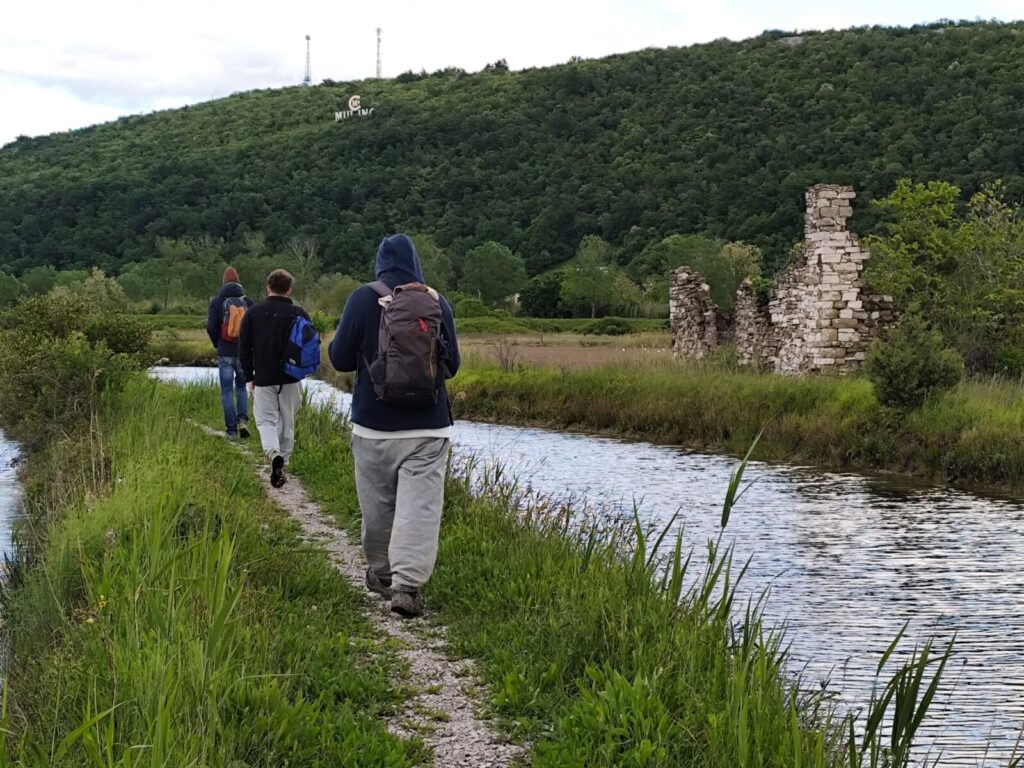
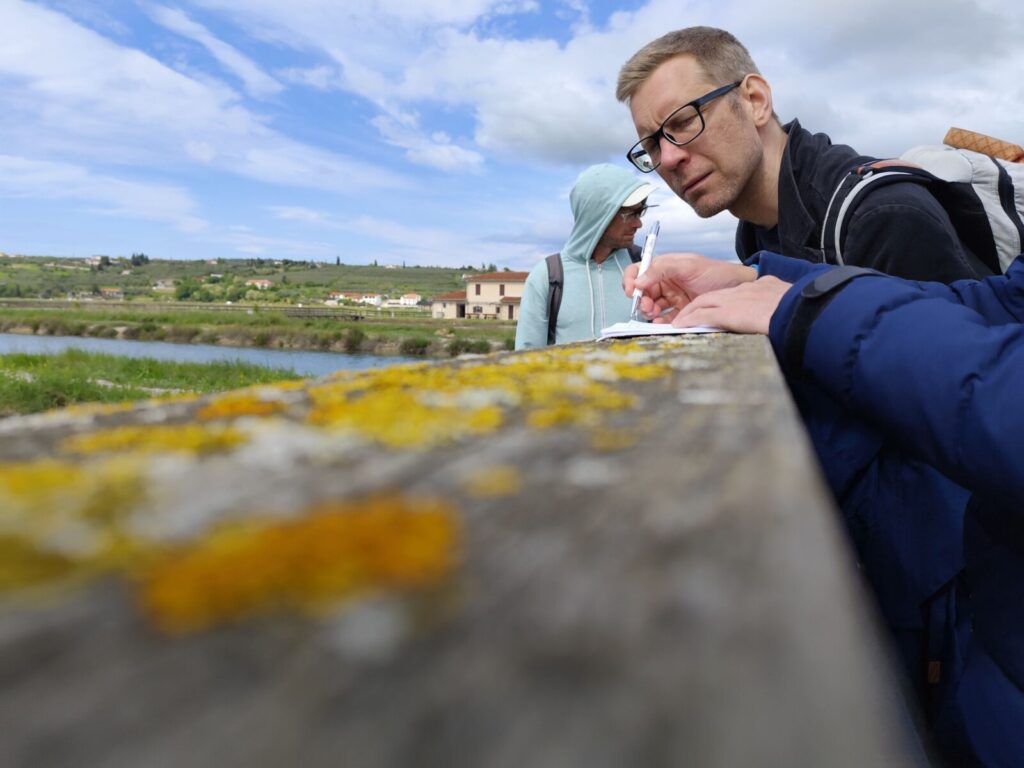
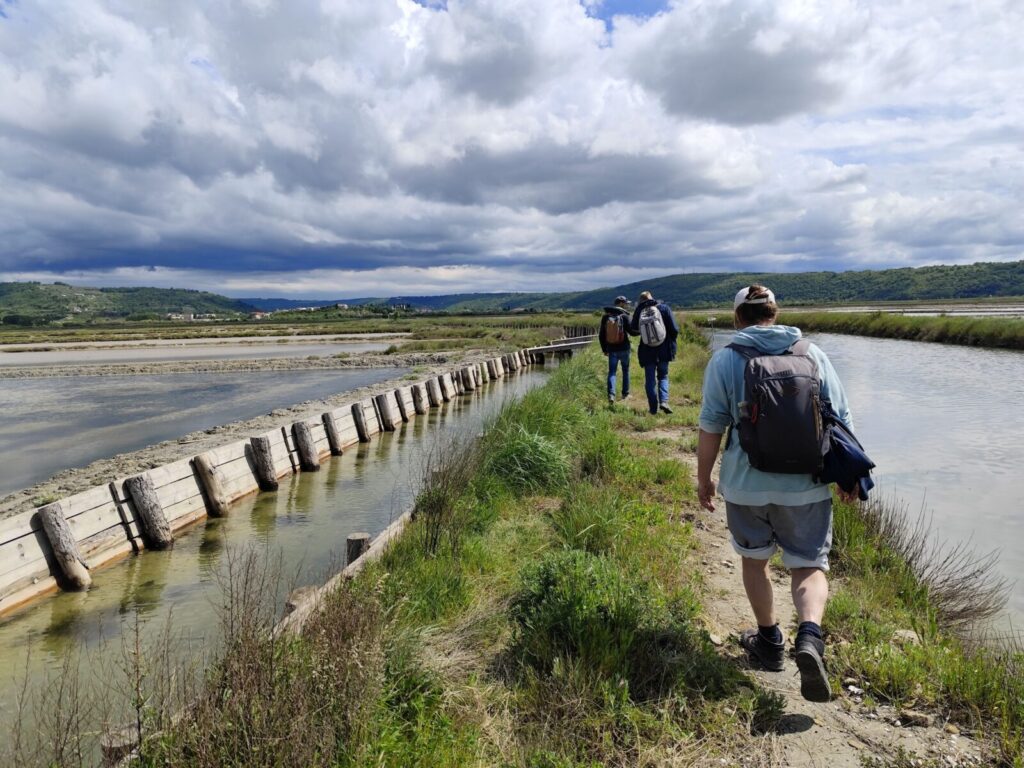
Comparative Eco-Ethnographic Study of Salt-Working: Cervia (Italy)
Cervia, 30 March–4 April and 4–6 August 2024
In early spring, Dr Maja Bjelica visited a saltern in the Italian town of Cervia to learn about salt-working practices outside of the Sečovlje saltern and to conduct comparative eco-ethnographic research. Prior to her visit, she learned about the structure of the local saltern through a conversation with the director of the local salt museum (MUSA, Museo del sale), Dr Annalisa Canali. Like the Sečovlje Salina, the Cervia saltern is managed as a nature reserve (Riserva Naturale della Salina di Cervia) – Bjelica found out about this when she met the head of the Visitor Centre, Dr Chiara Tiozzi. She also met the President of the La Salina di Cervia Park, Mr Giuseppe Pomicetti, who presented her the modernised salt production, which is based on an annual mechanical harvest. However, a small part of the salt production in Cervia is still dedicated to traditional salt-working, which takes place in the Camillone area of the saltern. There, salt-waking is carried out by volunteers from the local “Civilta Salinara” cultural association, which also runs the salt-working museum. Two volunteers and the association’s representative presented their activities, challenges and plans and spoke in an interview about their attitude to salt-working.
The established relationship was strengthened during a return visit to the saltern in the summer period when the salt was supposed to be harvested. However, at the beginning of August, when Bjelica returned from the Sečovlje saline with two volunteer salt workers, there was no harvest in Cervia due to rain. However, they joined a group of volunteers cleaning the crystallisation pools in the Camillone saltern and learning through fieldwork about the specificities of the local salt-waking process. The mutual interest in the salt-working methods of Cervia and Sečovlje led to an agreement for a return visit by the Cervia salt workers next year.
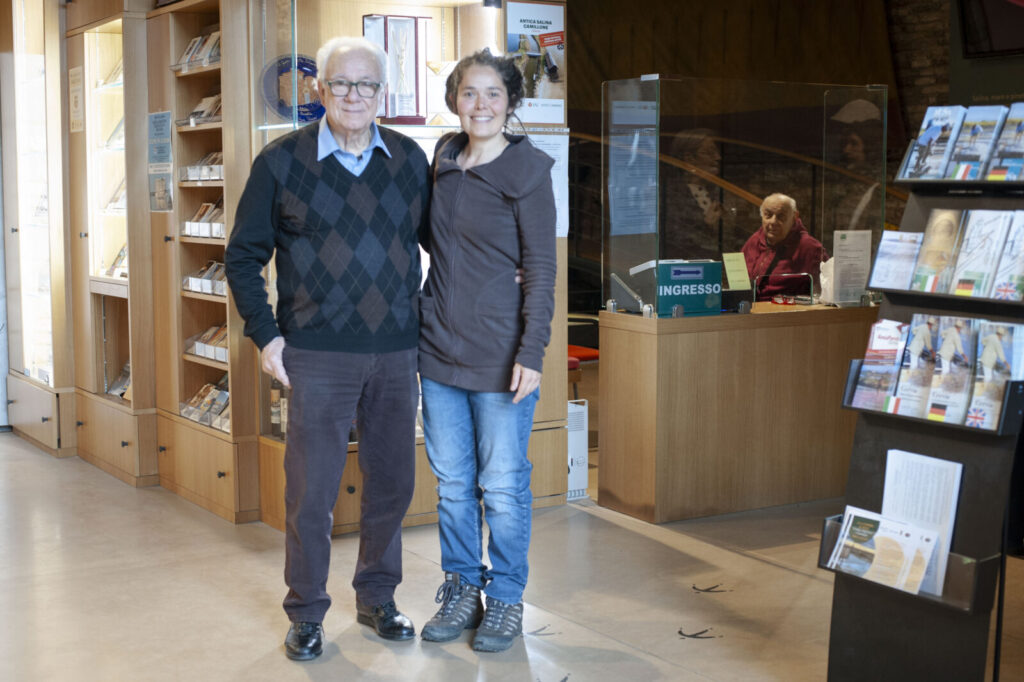
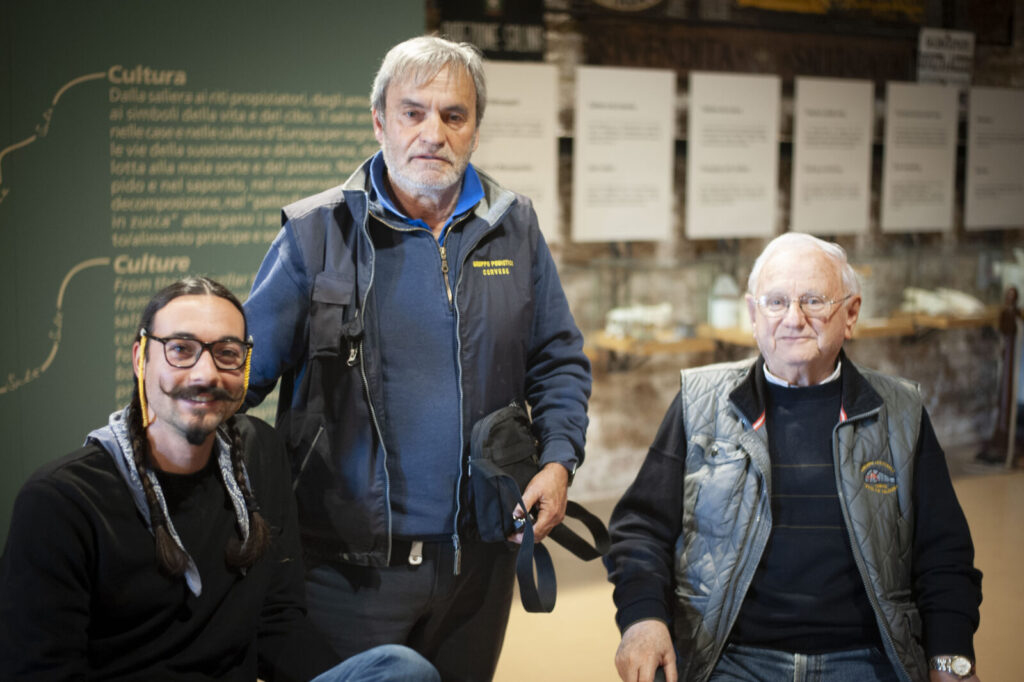
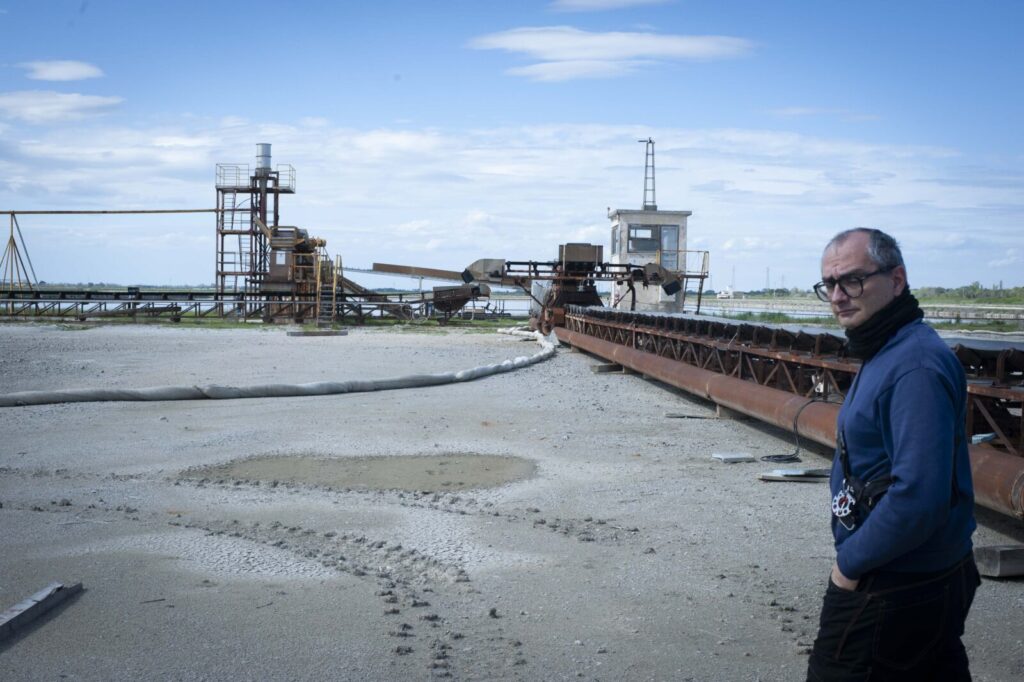
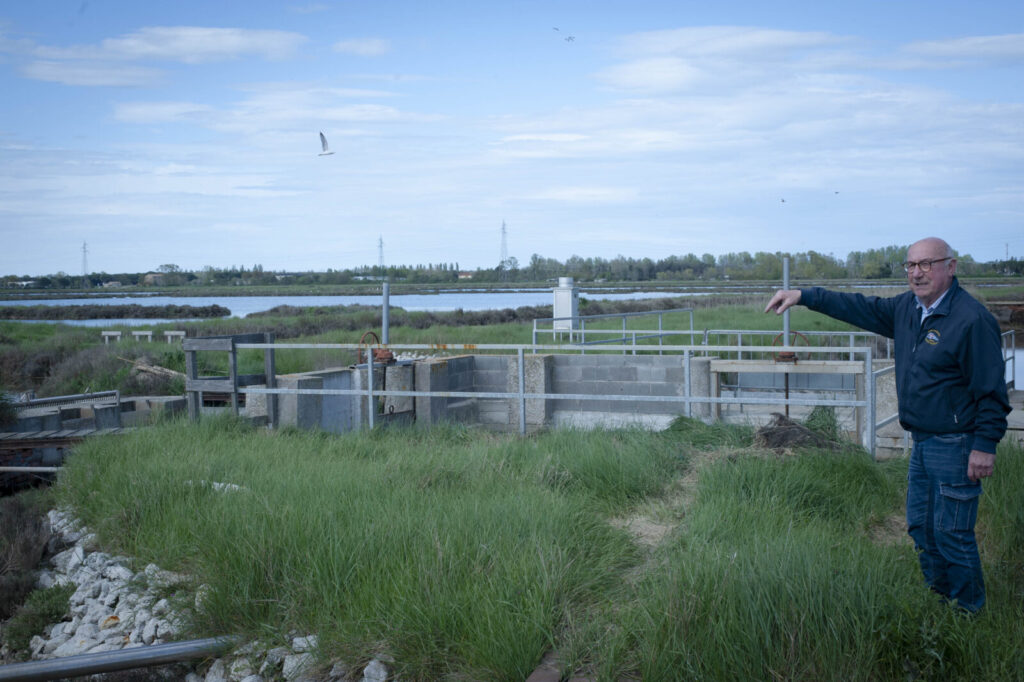
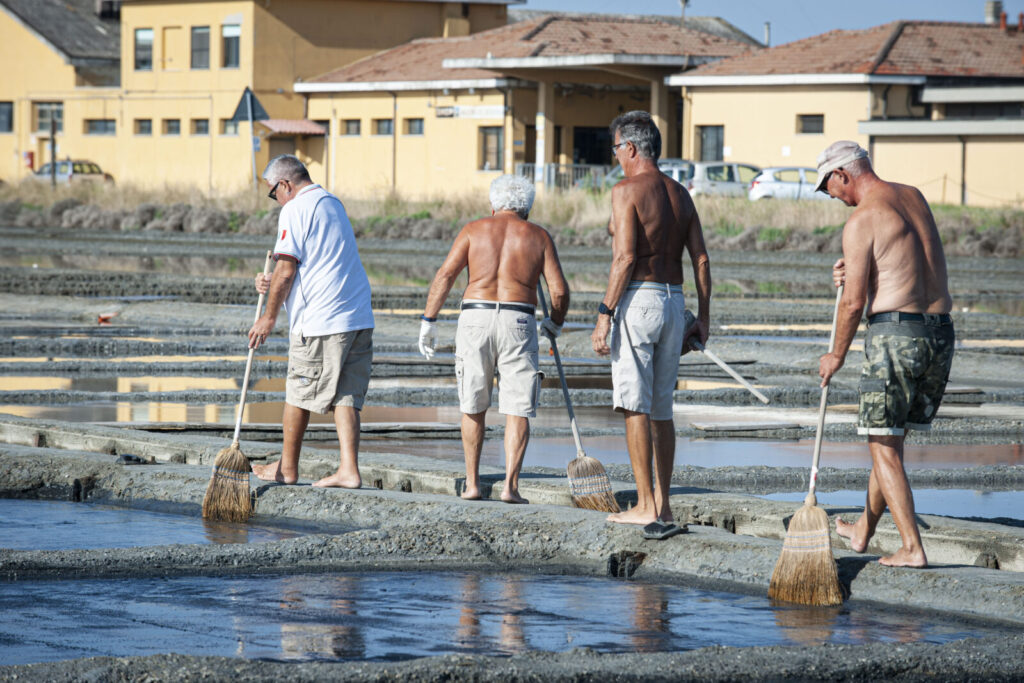
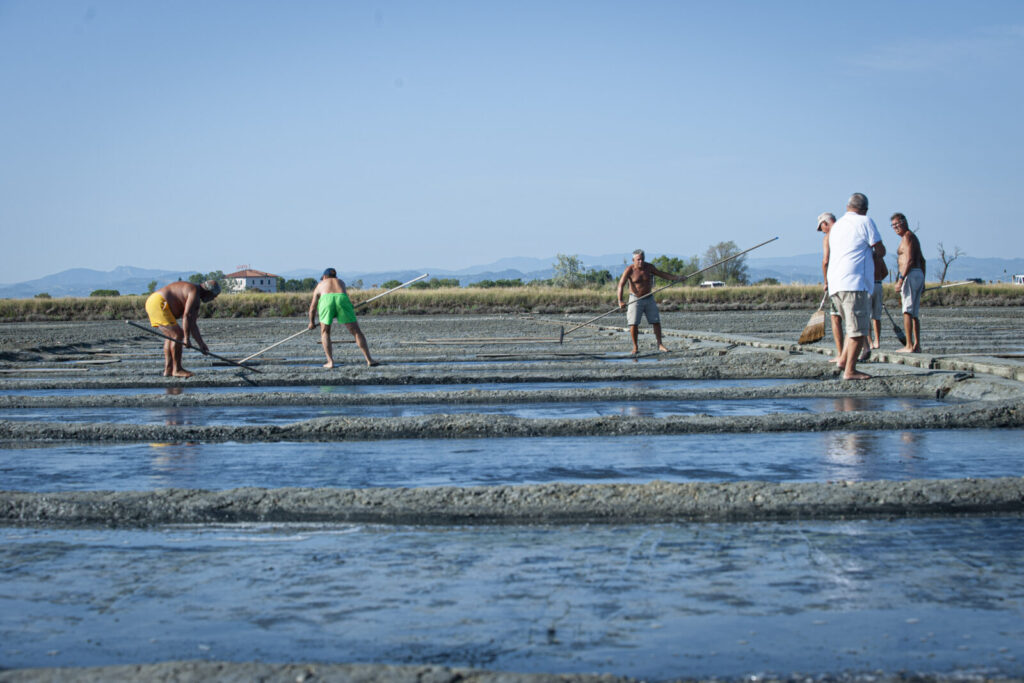
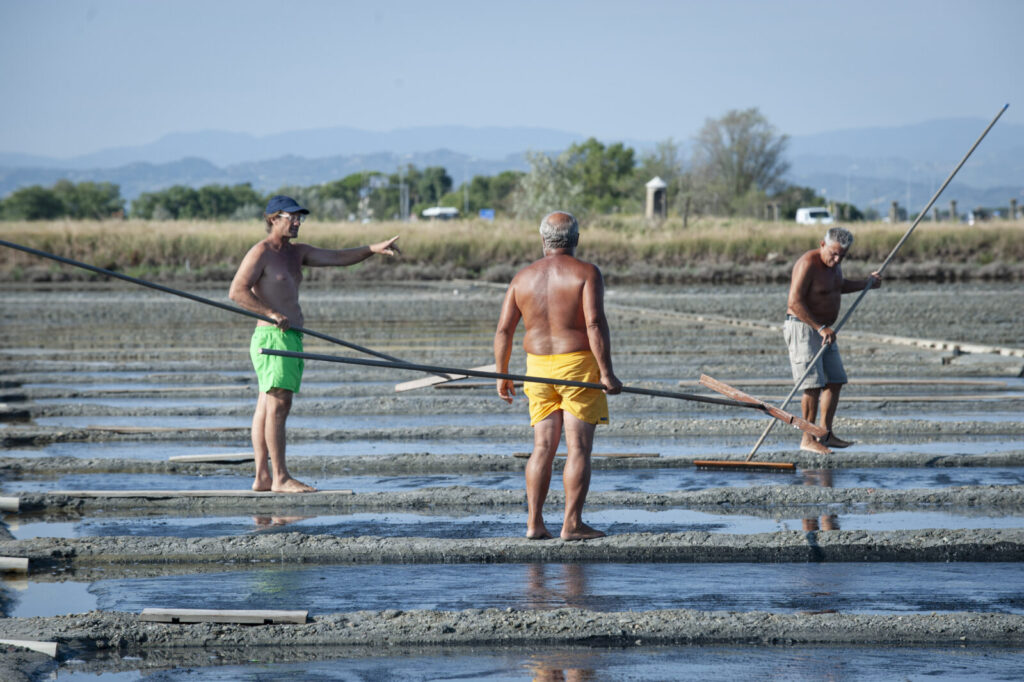
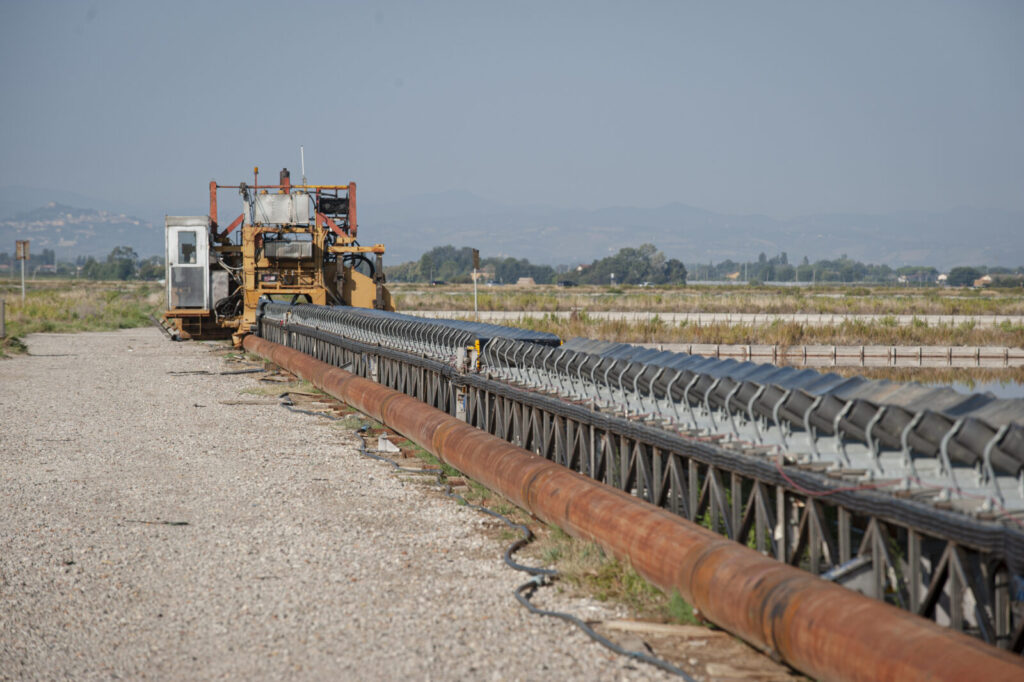
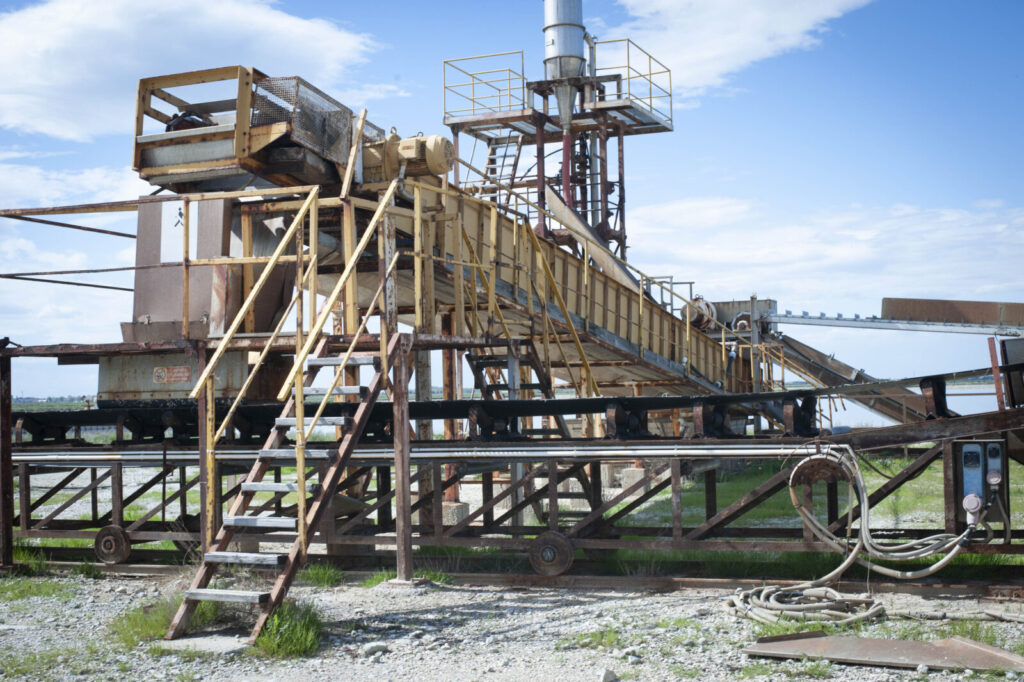
2nd and 3rd Project Seminar: Primož Pipan on the Heritage of Salt-Working, Petri Berndtson on the Elemental Poetics of Salt
Koper and online, 23 January and 18 April 2024
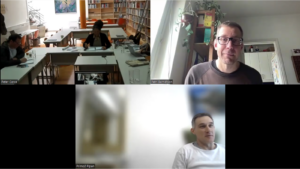
These project seminars are held with the aim of sharing knowledge within the interdisciplinary project group, as the members of the group are researching salt-waking from different fields of environmental humanities and social sciences. Primož Pipan from the Anton Melik Geographical Institute of ZRC SAZU, working in the field of geography, prepared a seminar for the project group entitled “Heritagisation of the Saltern’s Landscape.” He emphasised that the separate conception and treatment of heritage as cultural on the one hand and natural on the other has harmful consequences for the landscape itself and for human attitudes towards it. He argues that heritagisation processes should be designed in a more holistic way to ensure the formation of attitudes to the landscape that take its integrity into account. Petri Berndtson, a respiratory philosopher working at the Institute for Philosophical and Religious Studies of the Koper Science and Research Centre, entitled his seminar “The Phenomenological Path Toward the Elemental Poetics of Salt”. His philosophy of the elemental poetics of salt is based on two philosophers, Gaston Bachelard and Maurice
Merleau-Ponty. The former was concerned with the poetics of the elements, i.e. water, air, earth and fire, and the latter with perception, its reversibility and the possibility of experiencing and perceiving the latter. Berndtson led the project team in considering a possible phenomenological path based on experience and experiencing, which could stimulate the imagination, including dreaming, and lead to a turn towards elemental thinking about salt. The formation of salt crystals from the four elements (water – brine, air – wind, earth – petola and fire – sun) in salt-working can also be understood from the point of view of elemental crystallisation, i.e. a clarified insight into the process of salt formation and its circumstances, in which the elements and their relationships play a key role.
Fieldwork in the Sečovlje Salina
Sečovlje Salina, Lera, from 11 January 2024 onwards
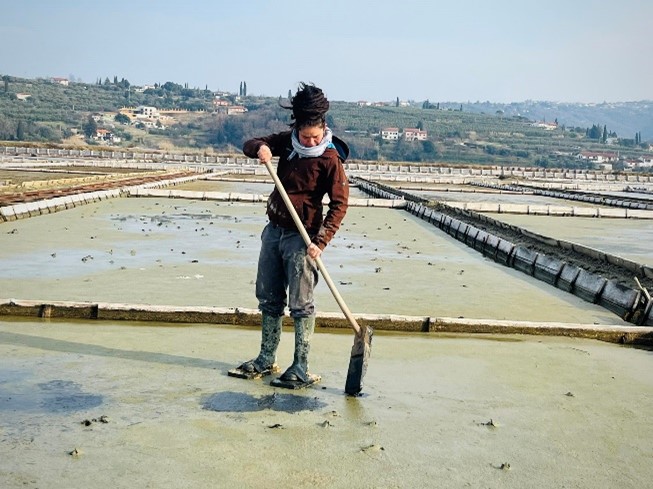
The project principal investigator, Maja Bjelica, has been carrying out fieldwork in the Sečovlje Salina since January, using participant observation as the main ethnographic method. She joined a group of salt workers employed by the company Soline, Pridelava soli, d.o.o., and they together carried out the necessary restoration work on the salt pools, such as “taciranje” (softening and hardening damaged parts of the bottom of the crystallisation pools), washing of the “kavedins” (crystallisation pools), rolling the “kavedins” in order to consolidate the new layers of mud, and the like.
2023
1st Project Seminar: Nataša Rogelja Caf – Walking, Writing, Walking Seminars / Footnotes
Online, 6 December 2023
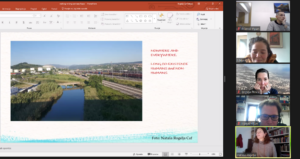
At the first project seminar, Dr Nataša Rogelja Caf, a research fellow at the Slovenian Migration Institute ZRC SAZU, gave a presentation entitled “Walking, Writing, Walking Seminars / Footnotes”, introducing us to the specific anthropological research methods used in the project group of the core project “Route Biographies: Walking and Writing as Methods for Researching Border Regions” (ARIS J6-4611), which she has been leading since 2022. She also introduced us to the so-called “walking seminars”, which take place regularly in the framework of the project and that form the basis of their publication Footnotes. Ethnographic Essays with Methodological Reflections on Walking and Writing.
Paper Presented at the International Symposium on Sonic Ecologies
Budapest, 21-25 November 2023
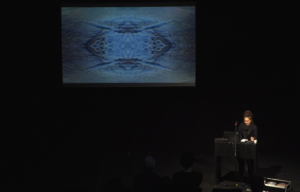
Maja Bjelica participated in the international symposium Beyond Listening: Agency, Art, and the Environment: International Symposium on Sonic Ecologies, organised by CENSE (Central European Network for Sonic Ecologies) at MOME (Moholy-Nagy University of Art and Design Budapest). She gave the lecture “Experiencing Listening Beyond Listening: “Essay in Environmental Ethics of Care,” in which she questioned, among other things, the possibilities of an ethics of listening in the relationship between human beings and the environment, such as the saltern.
Meetings with Representatives of Institutions Working in the Sečovlje Salina
Seča, Piran and Koper, October–December 2023
During the initial months of the project research, the members of the project team met with representatives of the institutions present in the Sečovlje Salina: the Sečovlje Salina Nature Park, the company Soline, pridelava soli, d.o.o., the Maritime Museum “Sergej Mašera” Piran – Pirano and the Institute for the Protection of Cultural Heritage, Piran regional branch. We managed to agree on research cooperation: so far, we have access to the research area, direct contact with the community of salt workers, and specific documents and premises for research at our disposal. Further details of the cooperation will be determined during the implementation of the project.
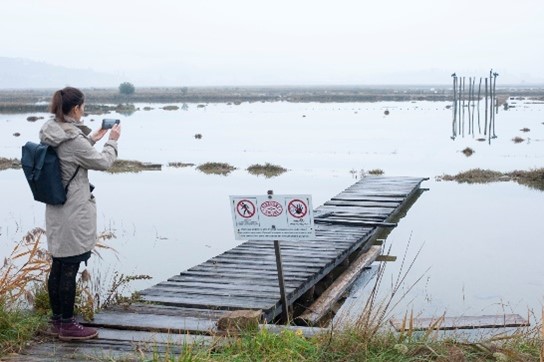
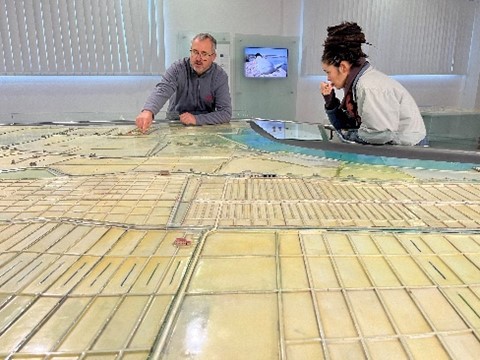
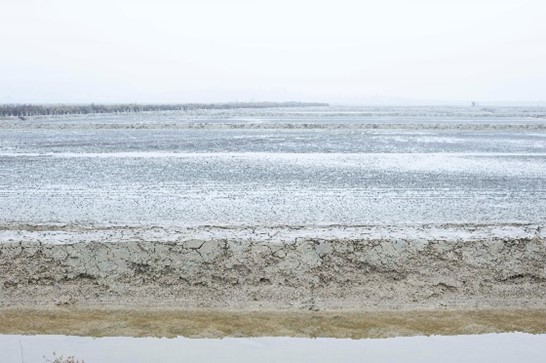
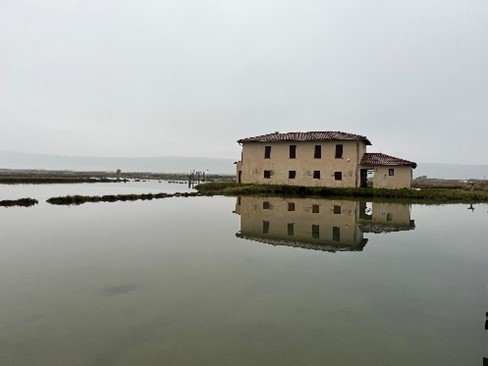
Results
2024
Bjelica, Maja. Elartemis#Saltemental. Series of photographs for the book God in Post-Christianity: An Elemental Philosophical Theology, by Lenart Škof. Cham: Springer, 2024.
Bjelica, Maja. “Listening to Silences, Listening to Rhythms.” A peripatetic lecture at the event TO)pot: Festival of radical soundwalks. Ljubljana, 26 September 2024.
Bjelica, Maja, and Matjaž Kljun. “Heritage in a grain of salt.” Ljudje in Zemlja TV programme. RTV Slovenia 1, 23 August 2024.
Kljun, Matjaž. “Saltern.” Pogled Nazaj talk show on Megafon TV. 19 August 2024.
Penca, Jerneja. “How transformative is the nature restoration law?” Presentation at the international workshop Nature-based governance: coevolutionary and transformative perspectives on the biodiversity and climate crises. Velke Karlovice, 24–26 September 2024.
Penca, Jerneja. “The invaluable heritage of the Piran saltern and the salt-making looks to the future.” News article about the event Ethnological evening: The Heritage of Saltworks, organised at the Slovenian Ethnographic Museum, 17 January 2024. Published on 22 January 2024.
Pipan, Primož. “The Heritage of Saltworks: Ethnological Evening, Slovenian Ethnographic Museum, Ljubljana, 17 January 2024.” Event report. Bulletin of the Slovene Ethnological Society, vol. 64, no. 1, 2024: pp. 140–141.
Pipan, Primož. “Fieldwork in the salterns of Nin, Pag and Ston in Croatia.” News article about the project fieldwork. Heriscope, 27 September 2024.
Škof, Lenart, Sashinungla, and Sigridur Thorgeirsdottir, eds. Elemental-Embodied Thinking for a New Era. Cham: Springer, 2024.
2023
Bjelica, Maja. “Experiencing Listening Beyond Listening: Essay in Environmental Ethics of Care.” Presentation at the international symposium Beyond Listening: Agency, Art, and the Environment: International Symposium on Sonic Ecologies. Budapest, 21-25 November 2023.
Events
2024
Centre for Humanities ZRS Koper, Koper, 5 December 2024
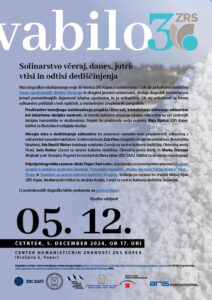
Salt-Working Yesterday, Today, Tomorrow: Impressions and Imprints of Heritagisation In cooperation with the Cultural Heritage Section of the Union of Historical Societies of Slovenia, the Scientific Research Centre Koper is organising an event dedicated to salt-working and its heritagisation. The main part of the event is a round table where the panellists discuss the different approaches to heritagisation and their impact on the contemporary perception of salt-working. The event will also include a presentation of the fundamental research project “Grain of Salt, Crystallising Cohabitation. Salt-Making as Experiential Environmental Wisdom“, carried out by the Institute for Philosophical and Religious Studies and the Mediterranean Institute for Environmental Studies of ZRS Koper and the Anton Melik Geographical Institute and the Institute of Slovenian Ethnology of ZRC SAZU. The event will be rounded off by the opening and guided tour of the photography exhibition “Božo Štajer: The World of the Salt Pans”, which was created in cooperation with the National Museum of Contemporary History, the Maritime Museum – Museo del Mare “Sergej Mašera” Piran – Pirano and the Institute for the Protection of Cultural Heritage of Slovenia
Museum of Salt Making, Fontanigge, 26 June 2024
Solinarska kulinarika: »Solinarska marenda« danes
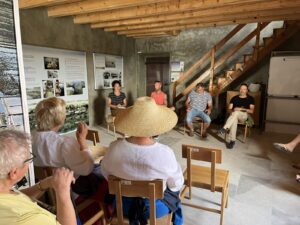
Salt-working Cuisine: “The Salt-workers’ Snack” today
With the project content, we joined the second event of the culinary-heritage project “Salt-working Cuisine”, organised for the fifth year in a row by the Maritime Museum – Museo del Mare “Sergej Mašera” Piran – Pirano, the Self-governing Community of the Italian Nationality of Piran with the Community of Italians “Giuseppe Tartini” Piran and the Institute for the Protection of Cultural Heritage of Slovenia in cooperation with other institutions. In Fontanigge, in the heart of the Sečovlje Salina, we prepared and tasted, among other things, a salt-workers’ snack. The main part of the meeting was a group interview conducted by the project leader, Dr Maja Bjelica, with three salt workers employed by Soline d.o.o.
You can find more about the event in the news item prepared by project assistant Barbara Bradaš Premrl.
Slovenian Ethnographic Museum, 17 January 2024
Ethnological Evening: the Heritage of Salt-Working
The heritage of salt-working has left its mark on this place and its people. At the ethnological evening, we presented the documentary film 30 Years of the Museum of Salt-Making, which was produced as part of the exhibition of the same name by the Maritime Museum “Sergej Mašera” Piran and the Institute for the Protection of Cultural Heritage. The film screening was followed by a discussion on the heritagisation of the saltern and the significance of salt-working today, moderated by Daša Ličen (Institute of Slovenian Ethnology, ZRC SAZU), who was also the initiator of the event. Participants in the discussion were Mojca Ravnik (Institute of Slovenian Ethnology, ZRC SAZU), Flavio Bonin (Maritime Museum “Sergej Mašera” Piran), Matjaž Kljun (Institute for the Protection of Cultural Heritage Piran) and Maja Bjelica (Institute for Philosophical and Religious Studies, ZRS Koper).
You can find more about the event in the news item prepared by project collaborator Jerneja Penca and in the report prepared for the Bulletin of the Slovene Ethnological Society by project collaborator Primož Pipan.
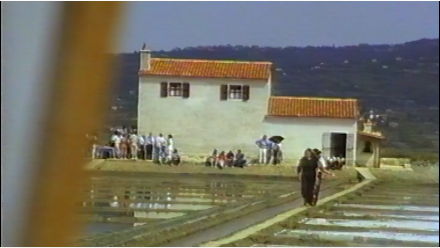
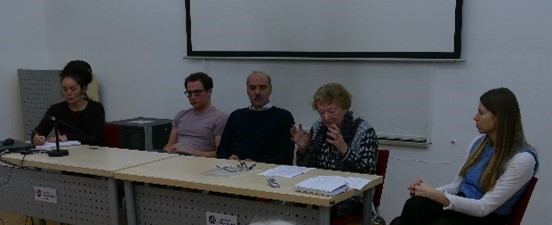
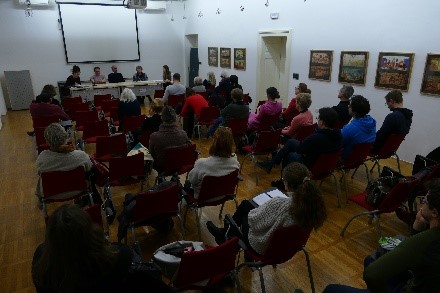
The photos on the project website were taken by members of the project team, unless otherwise indicated.
Links
Project website of the partner organisation ZRC SAZU:
Website of The Slovenian Research and Innovation Agency, which financially supports the project:
Websites of supporting organisations:
 en
en Slovenščina
Slovenščina Italiano
Italiano